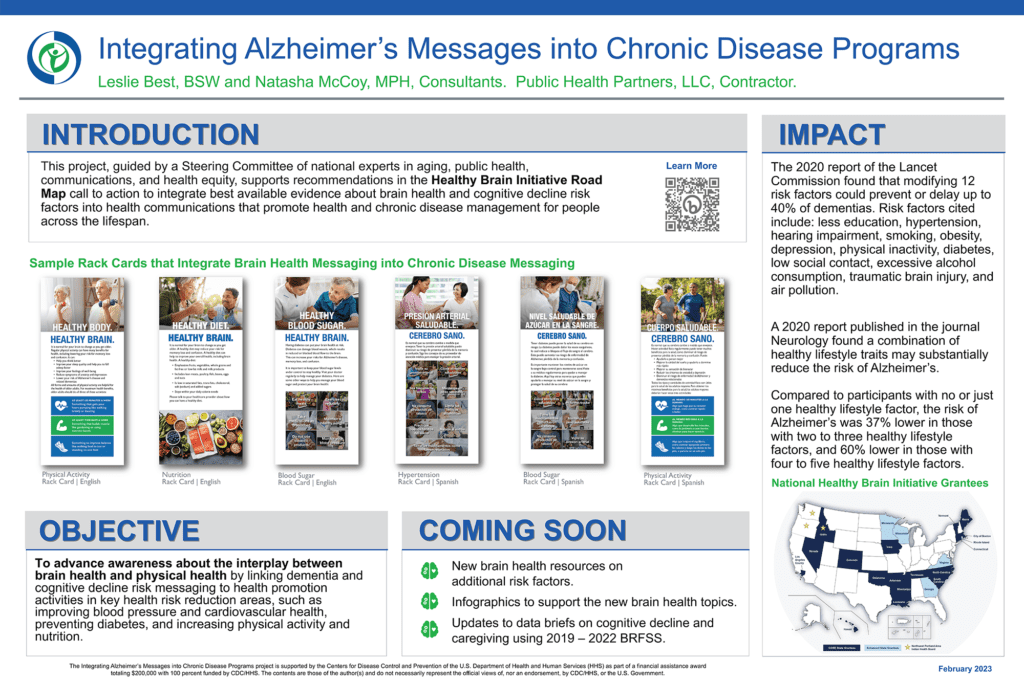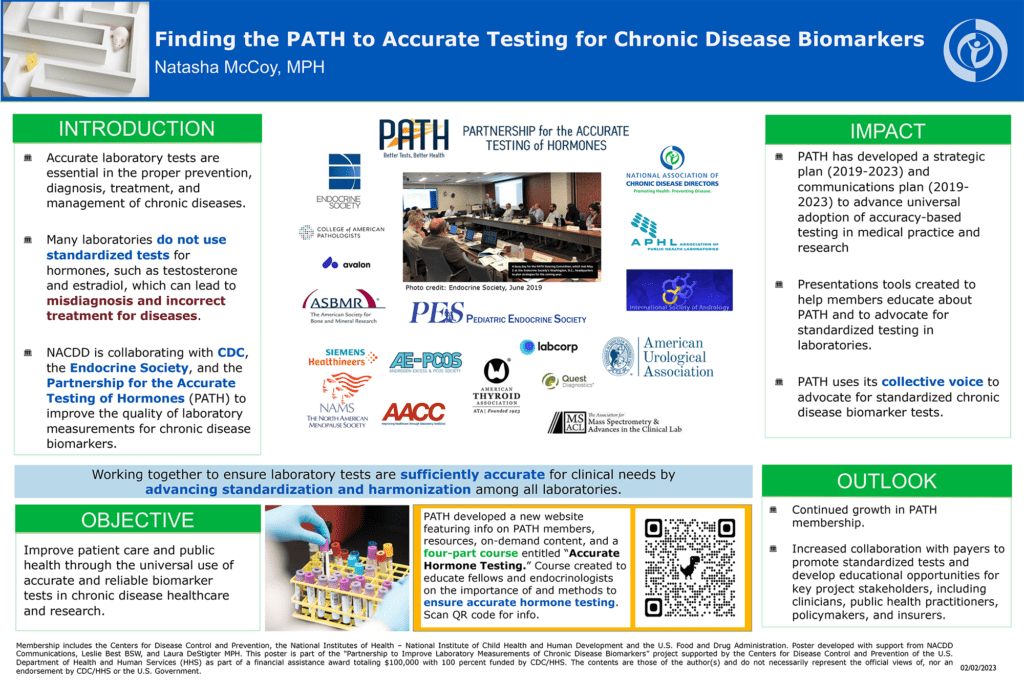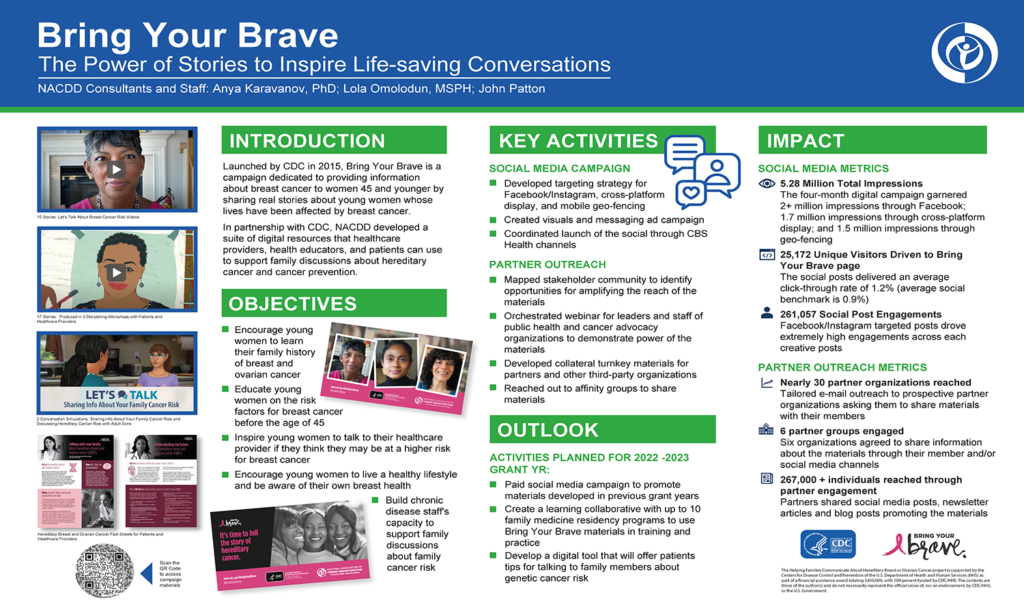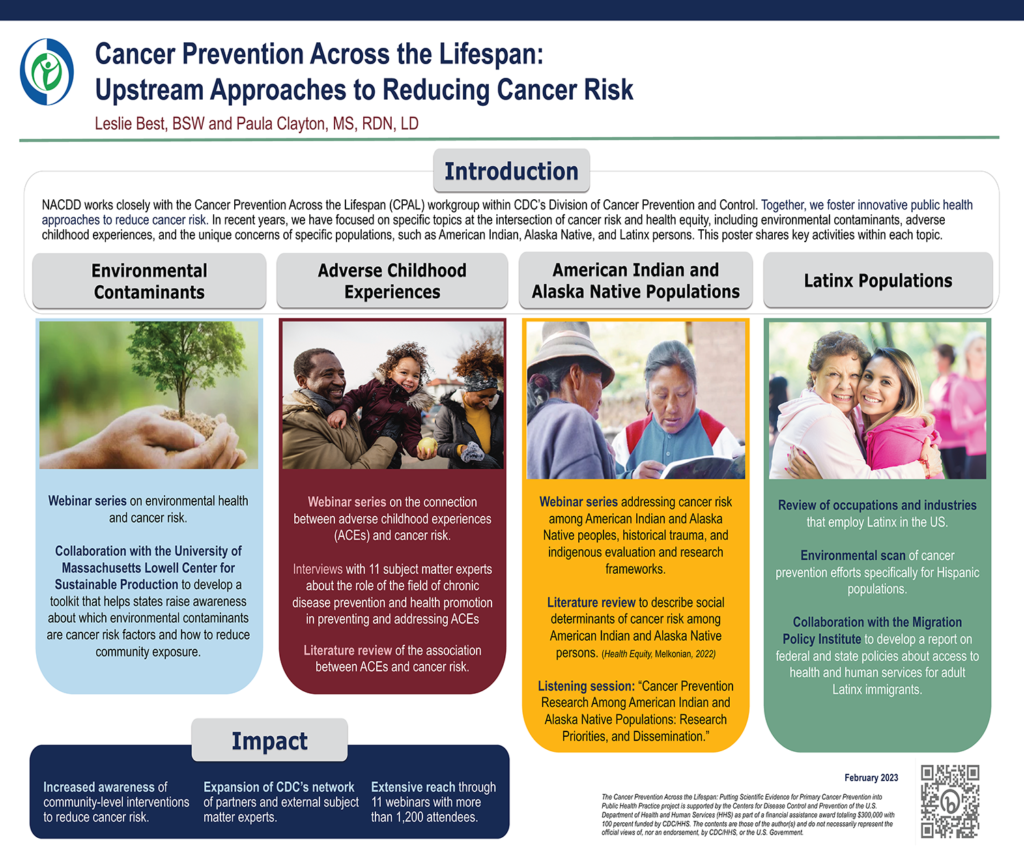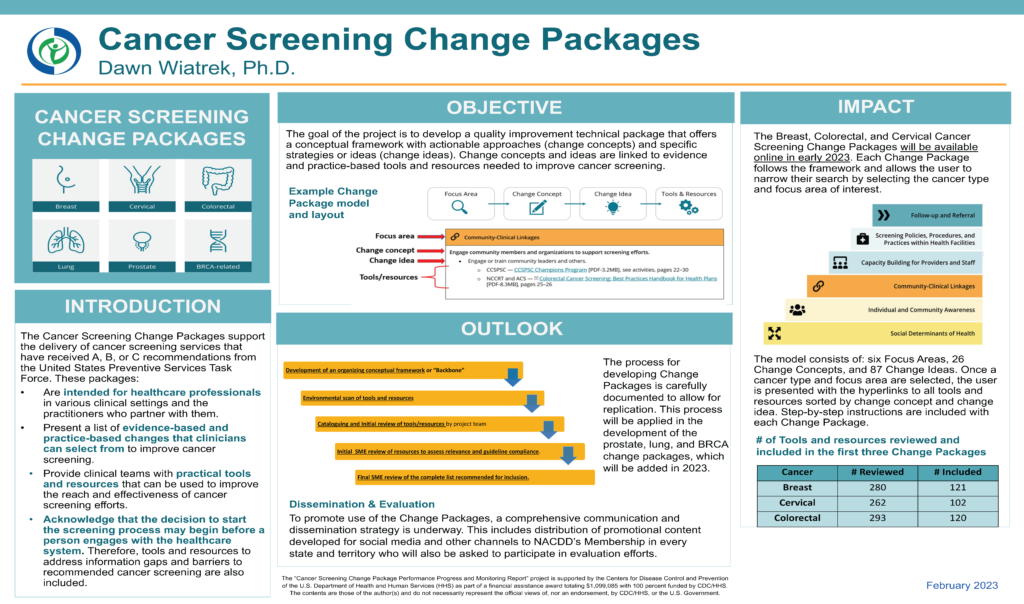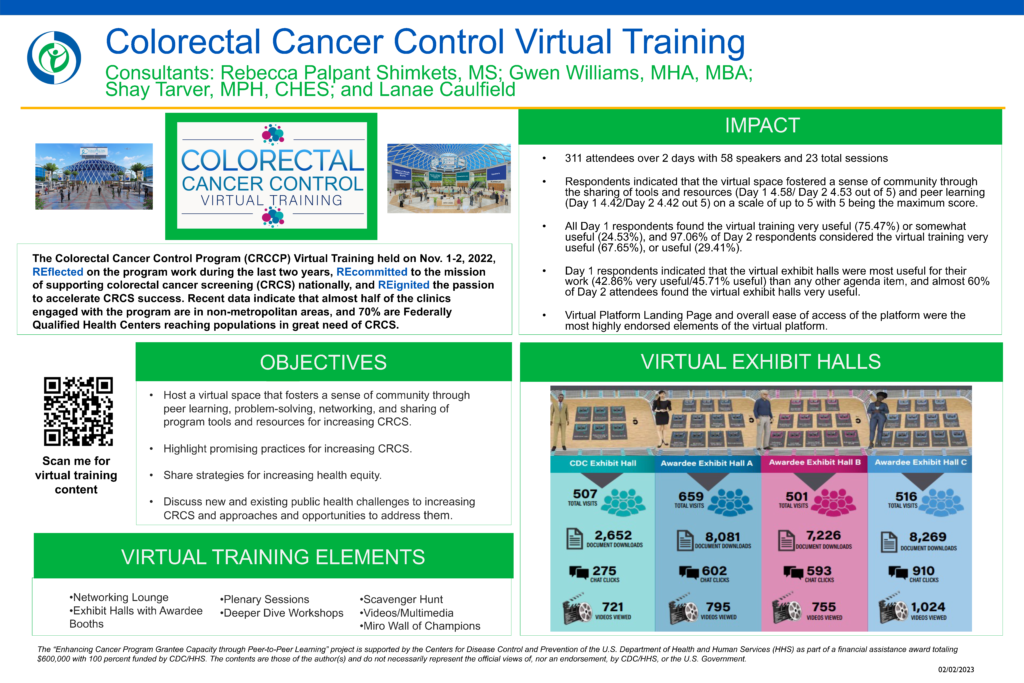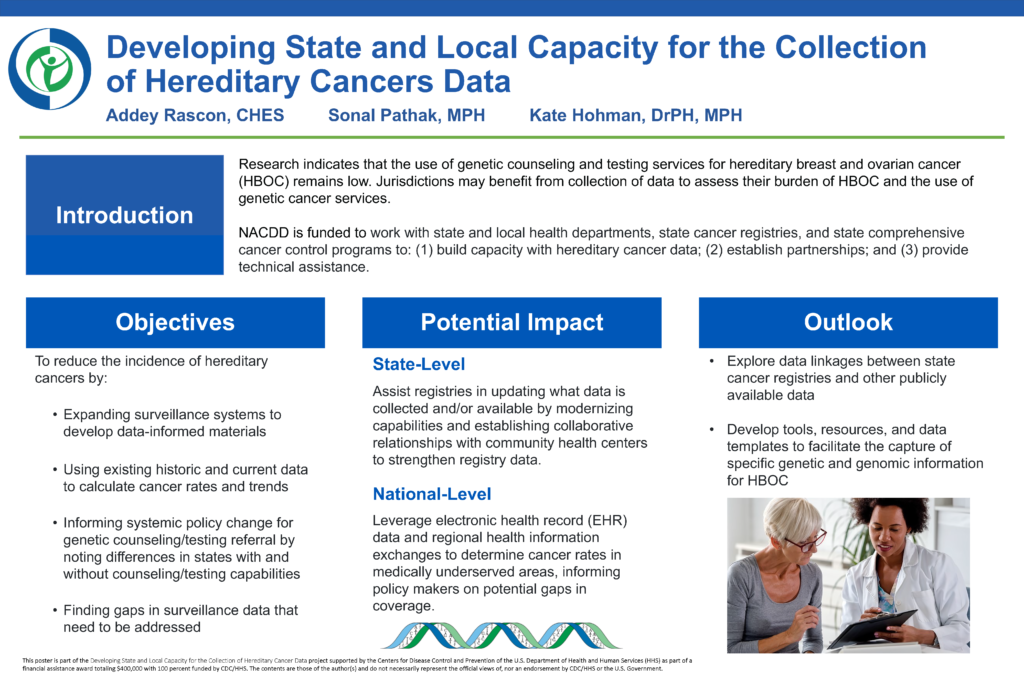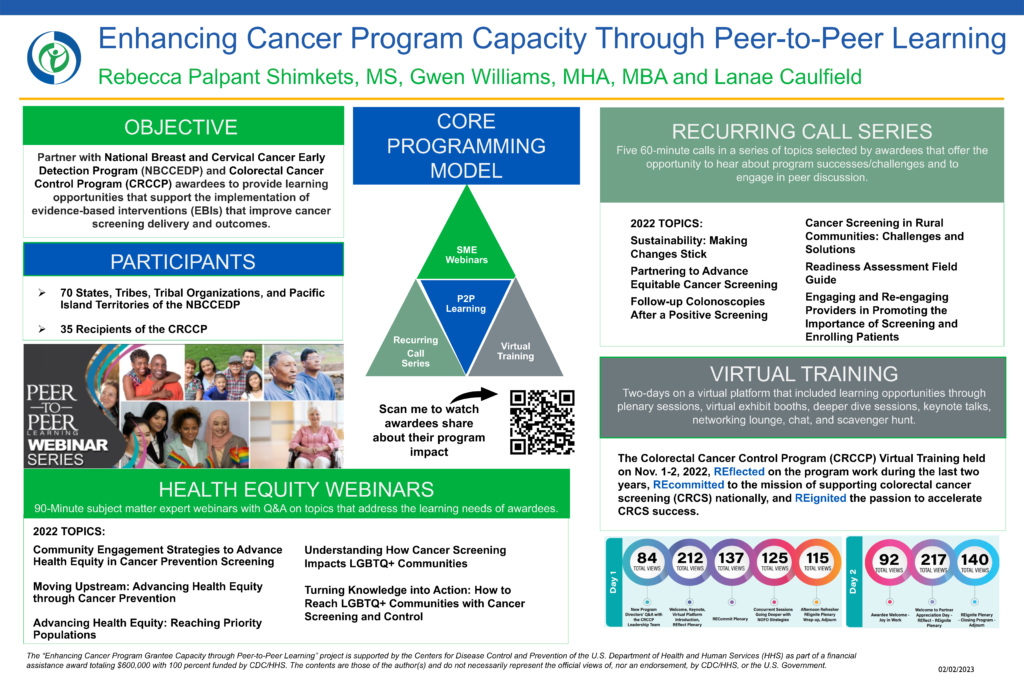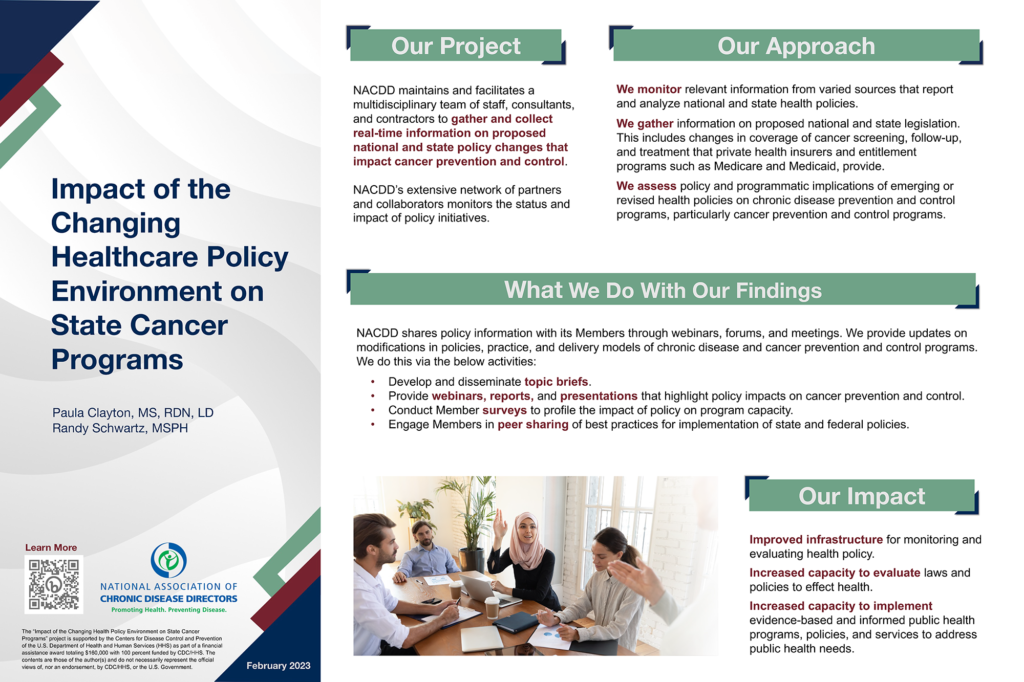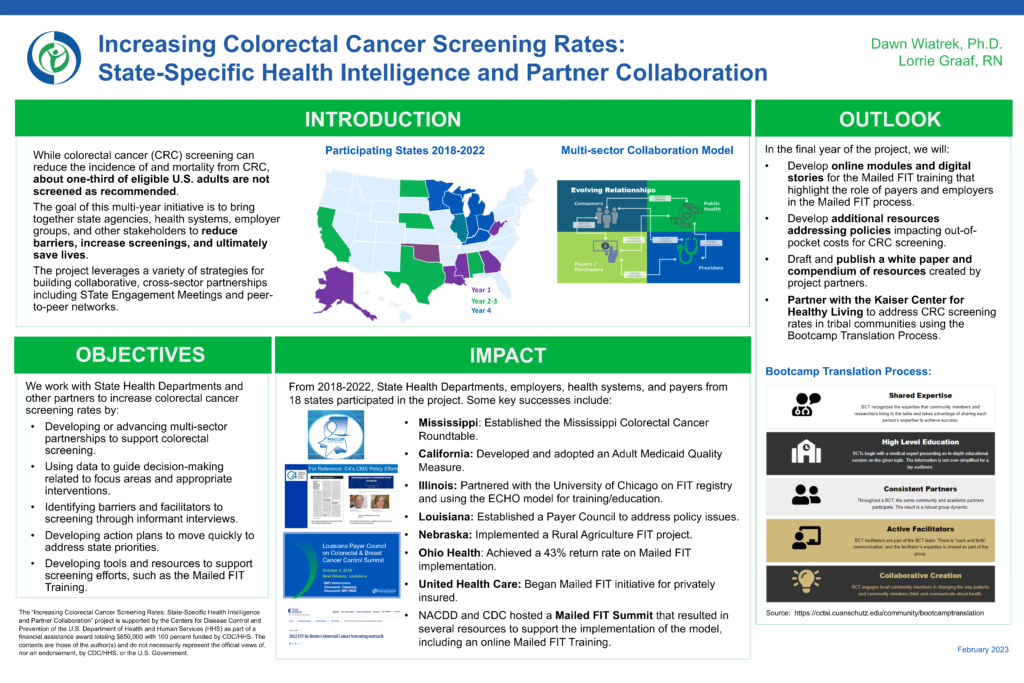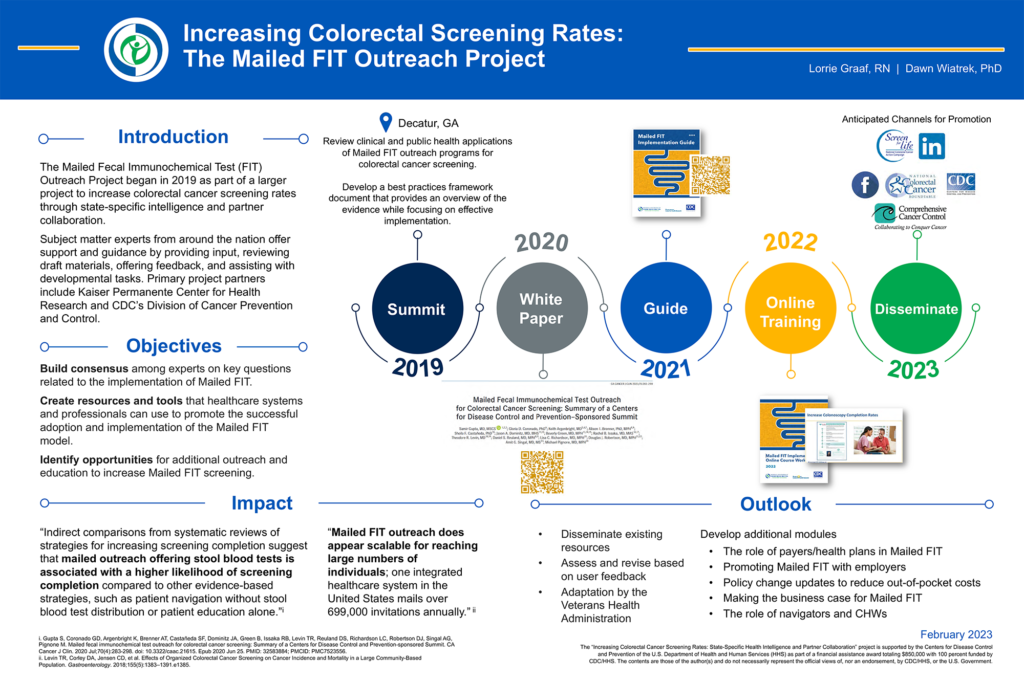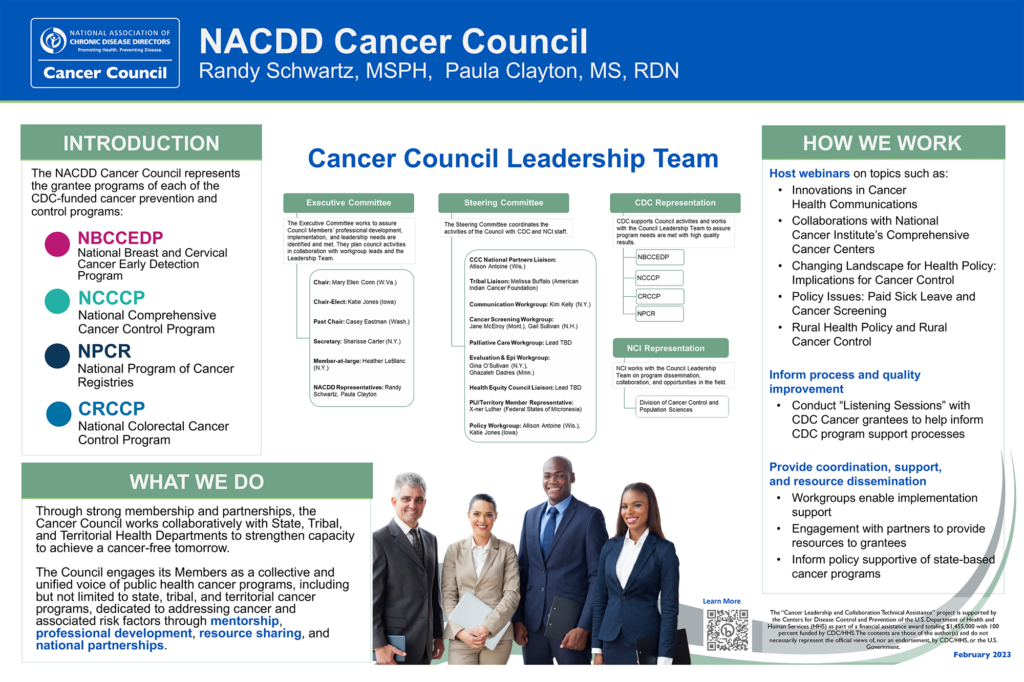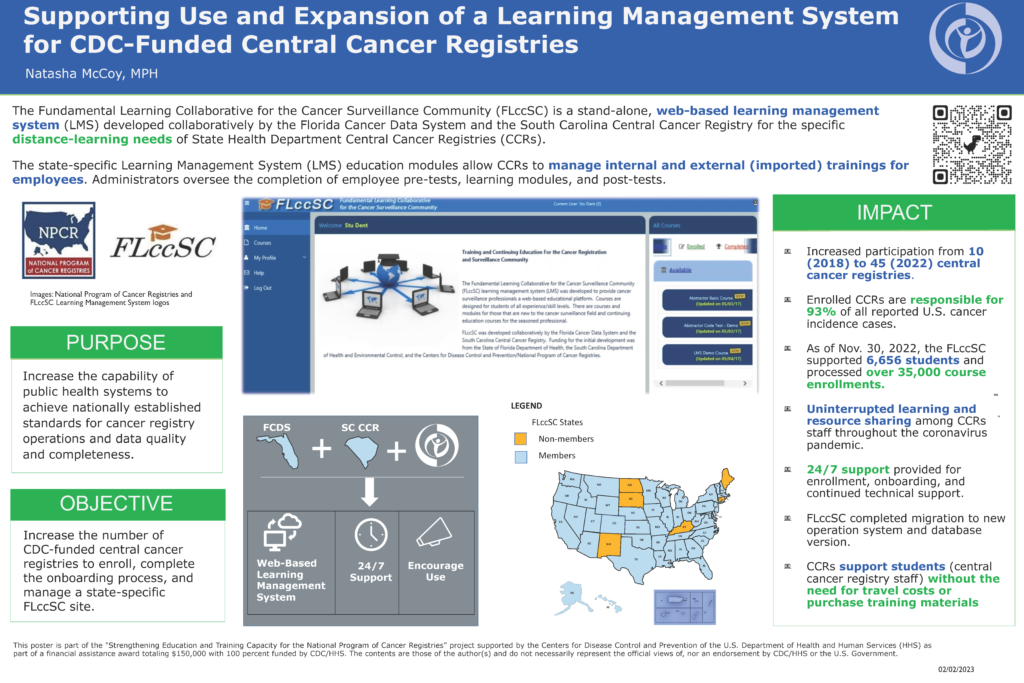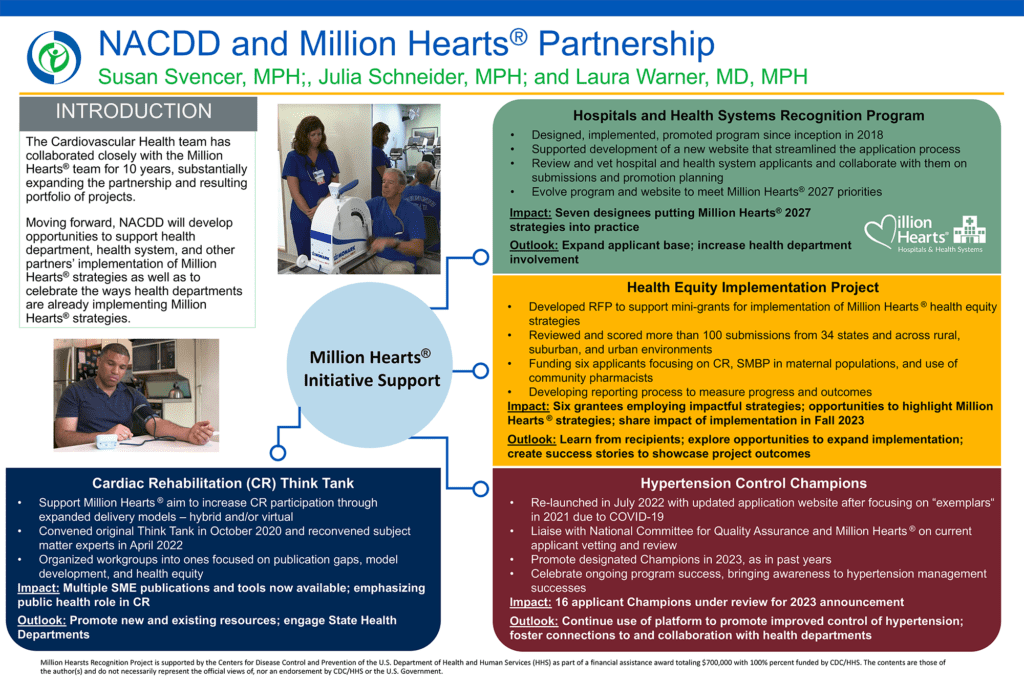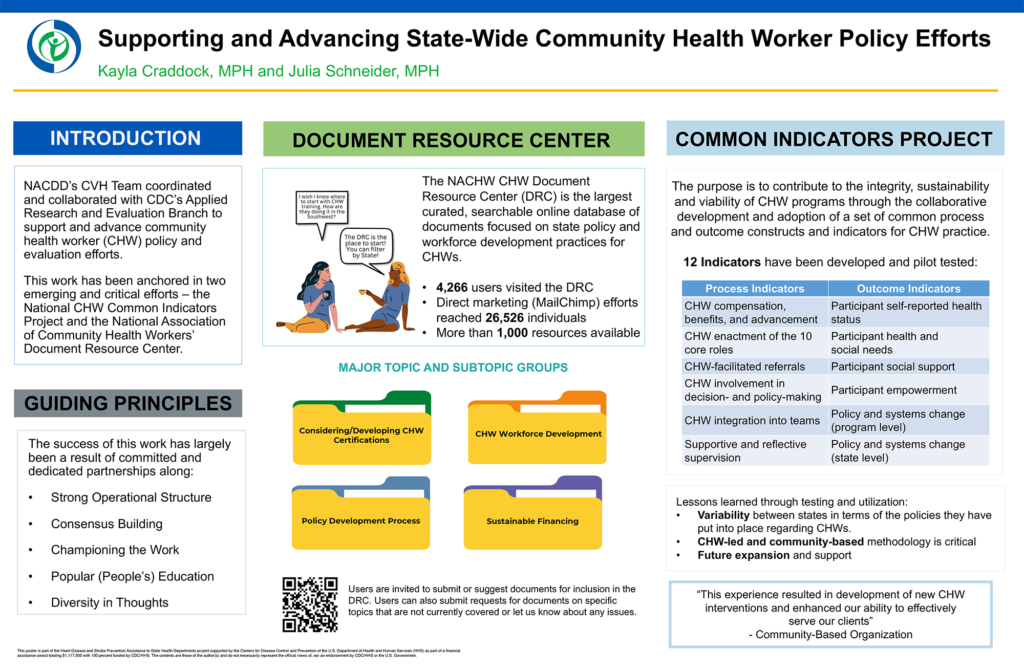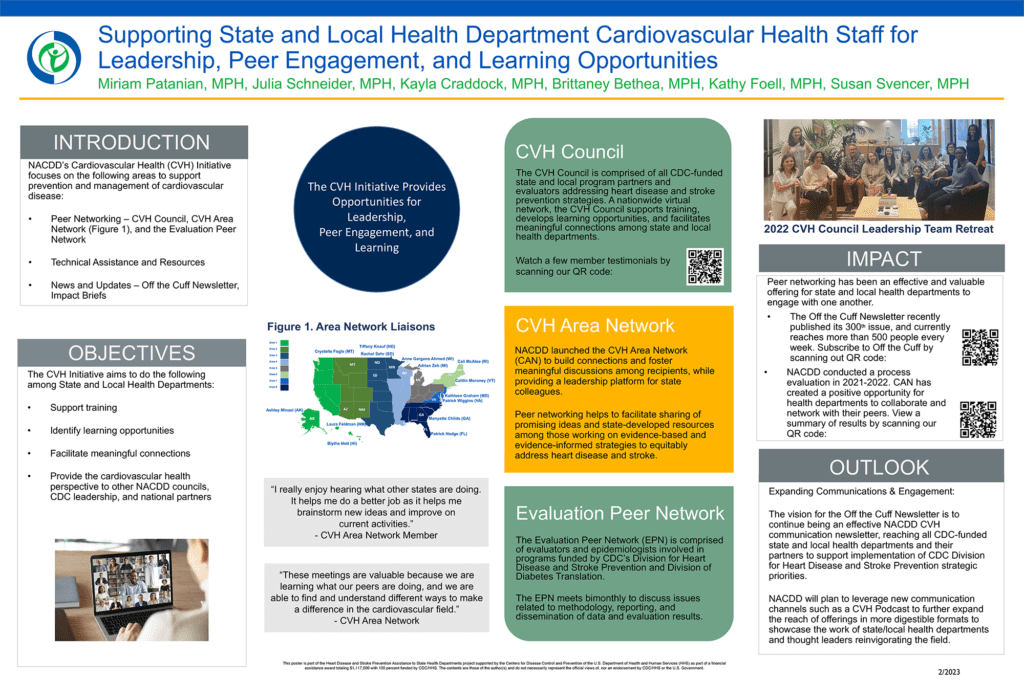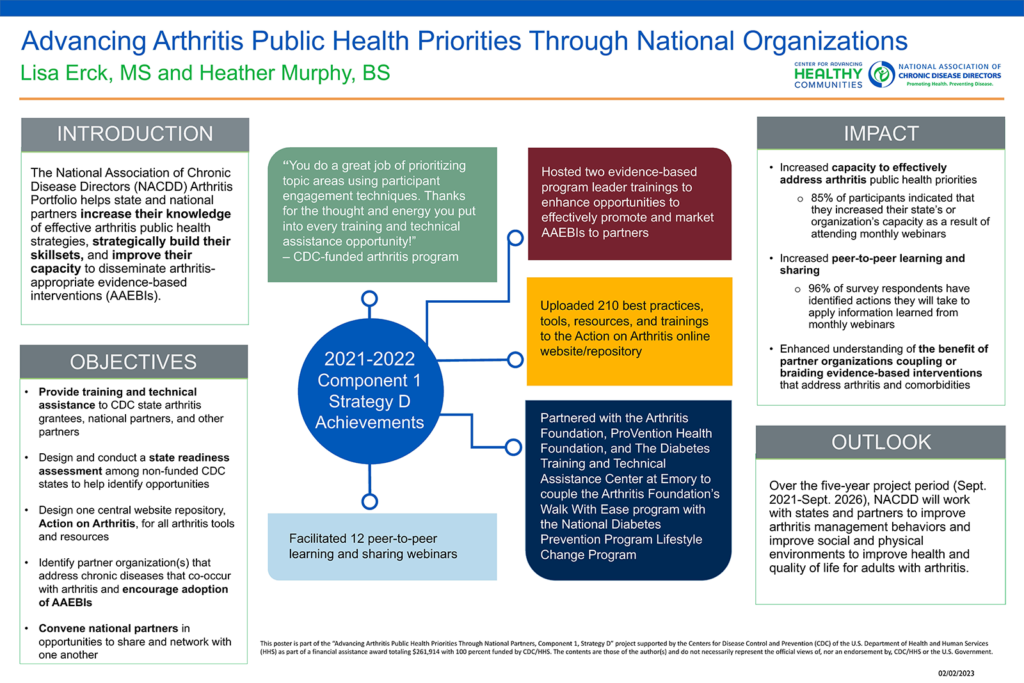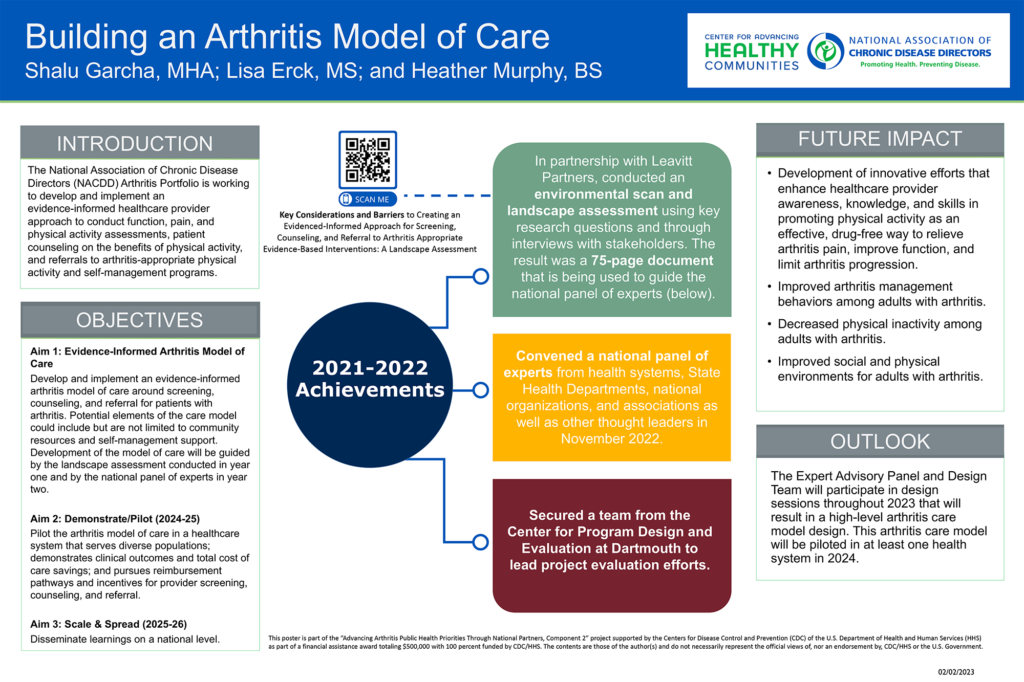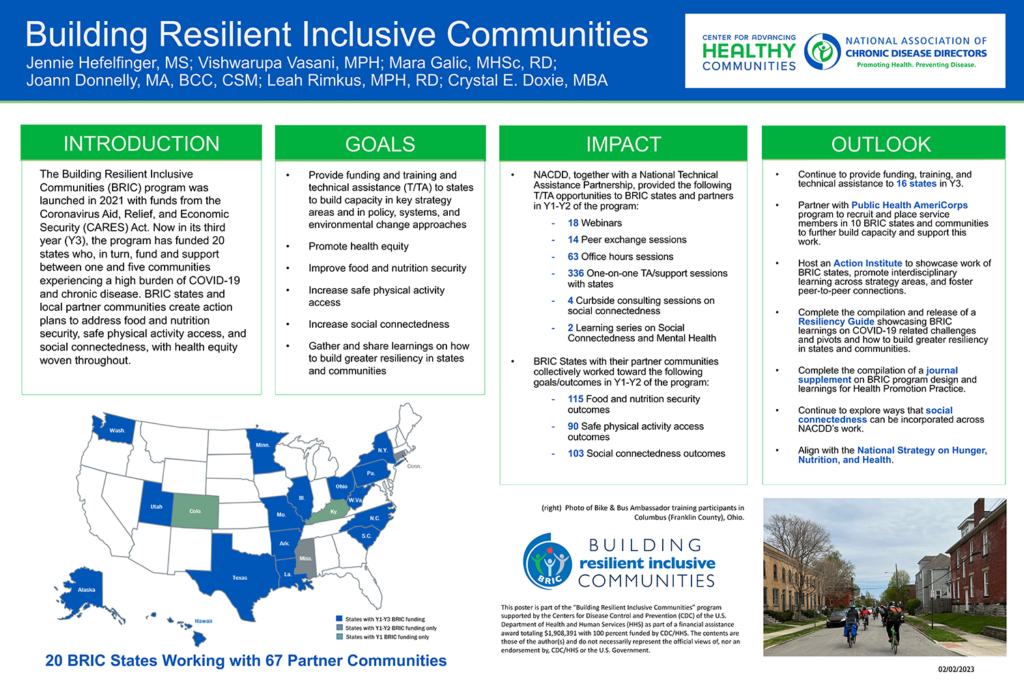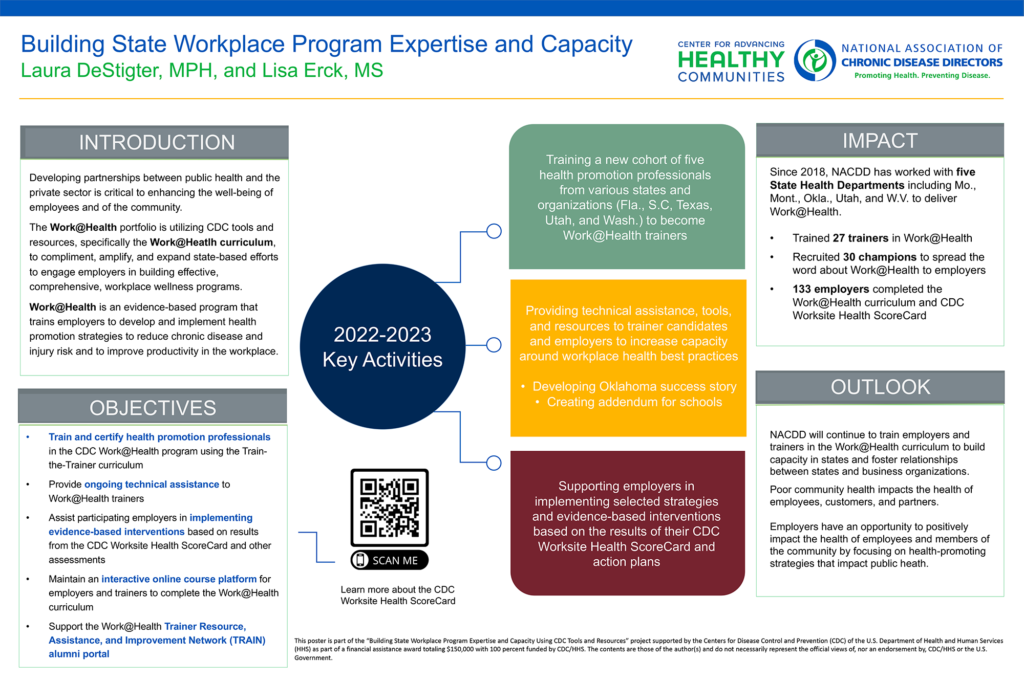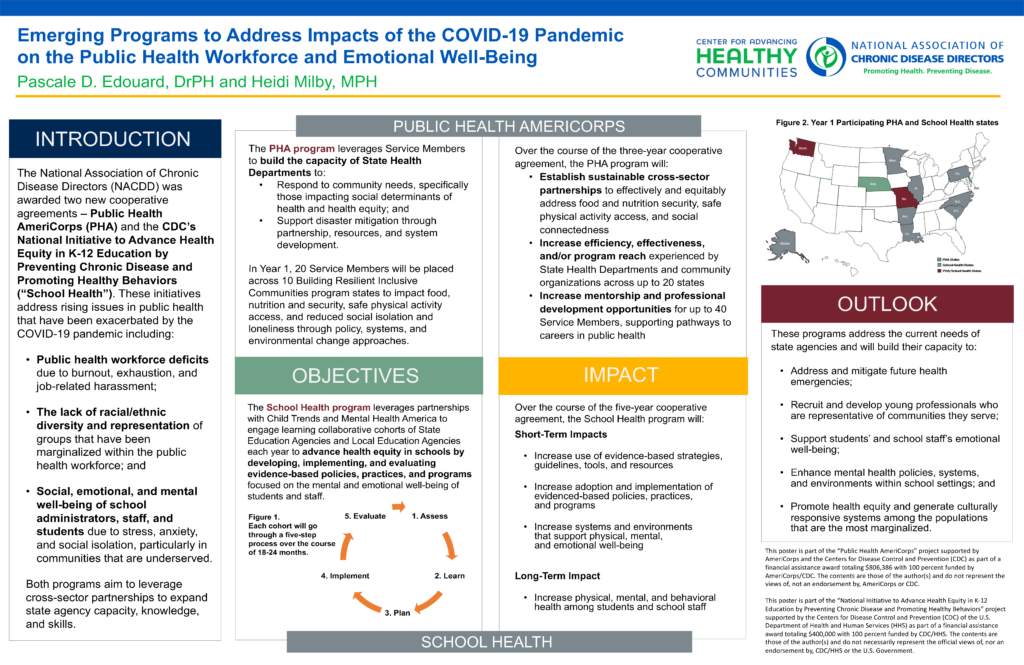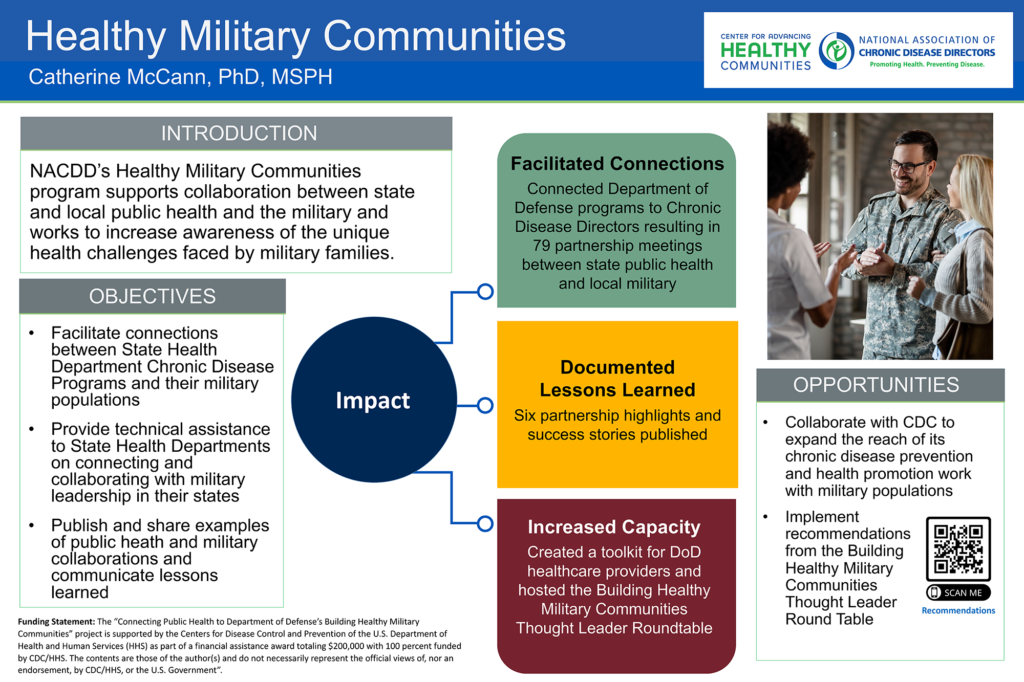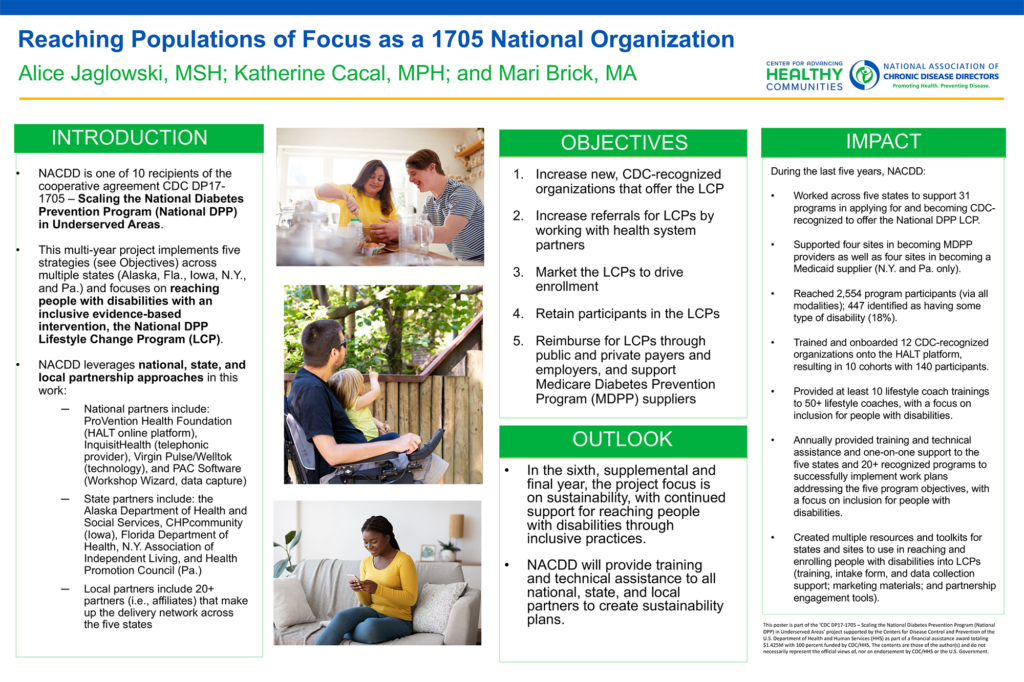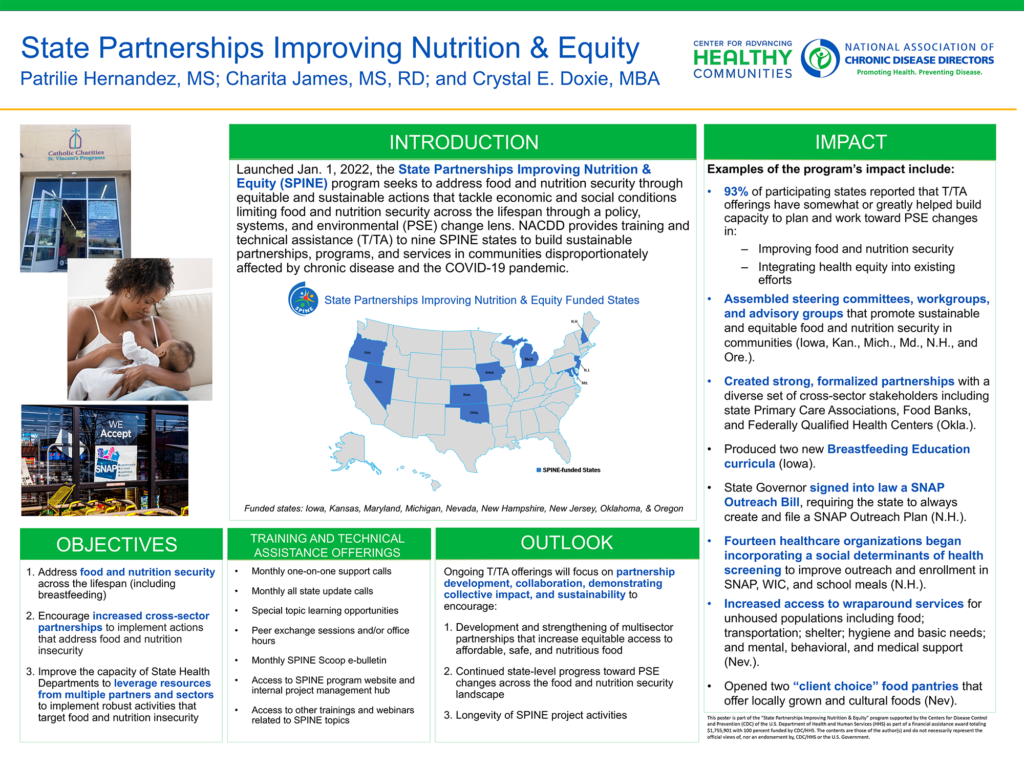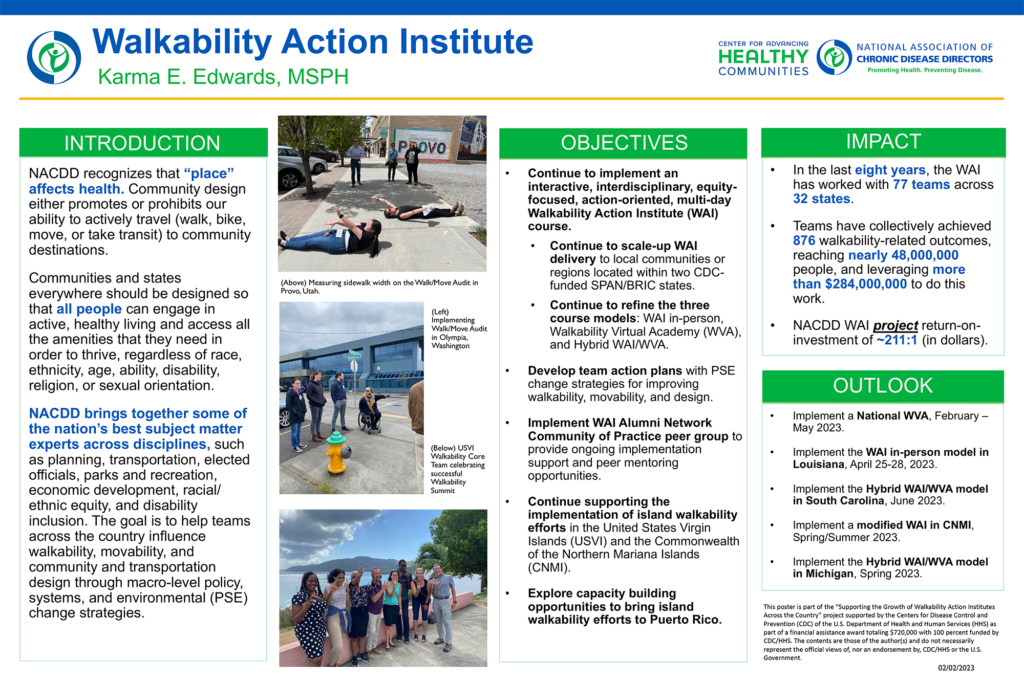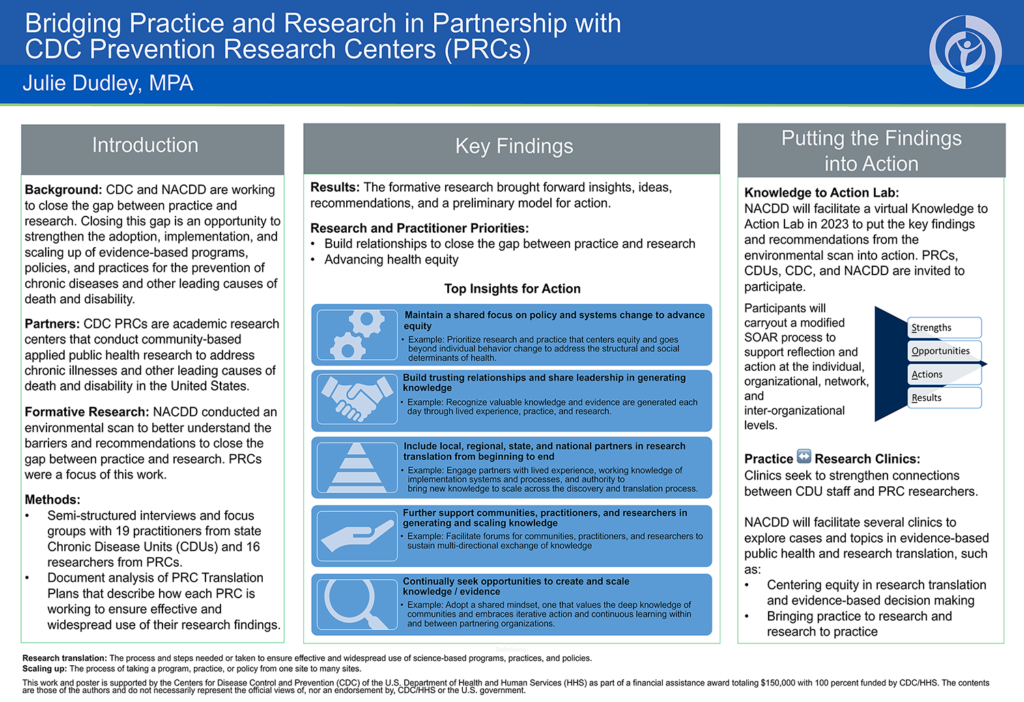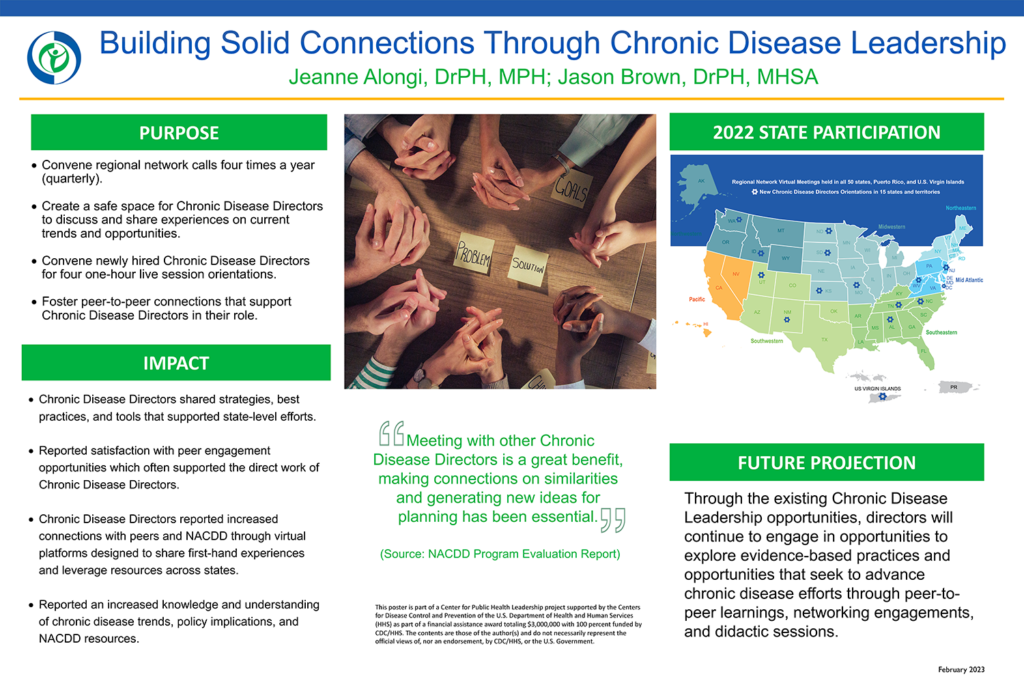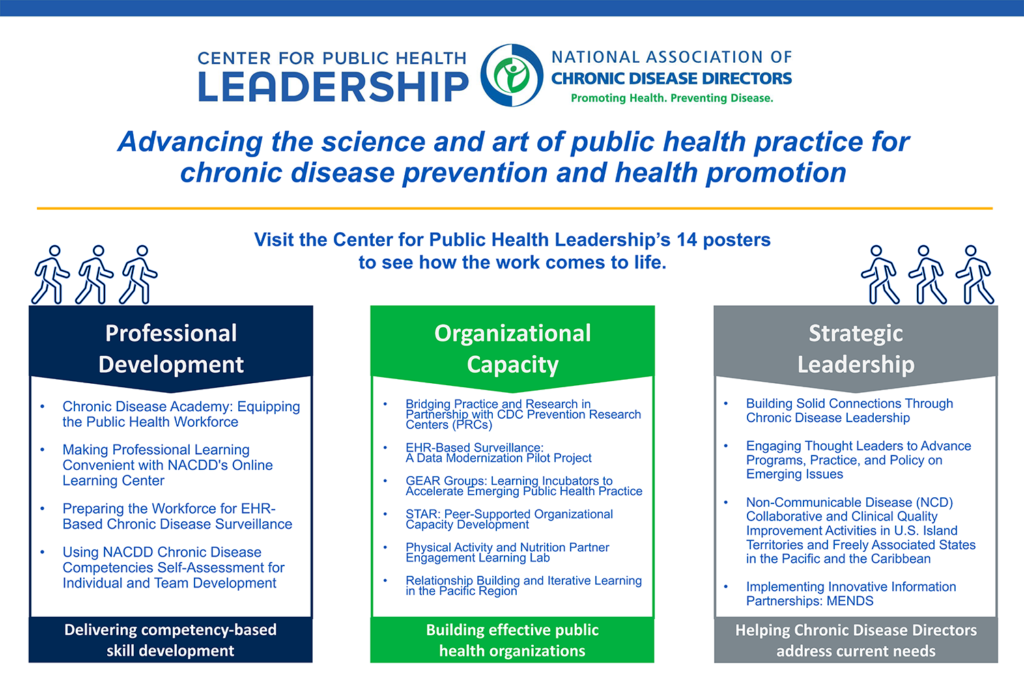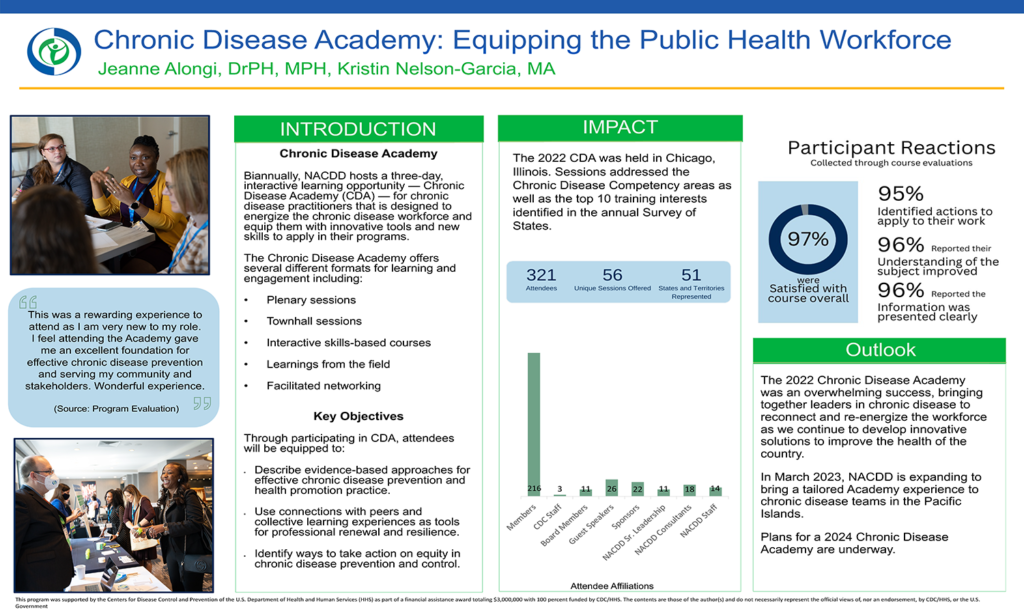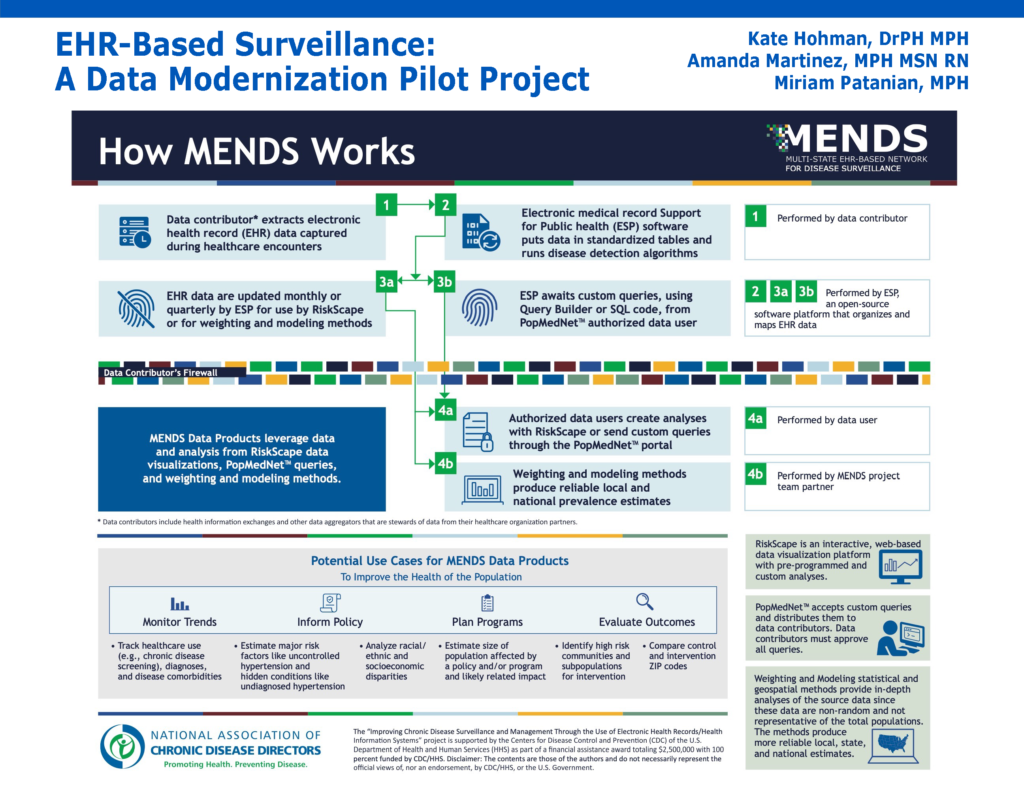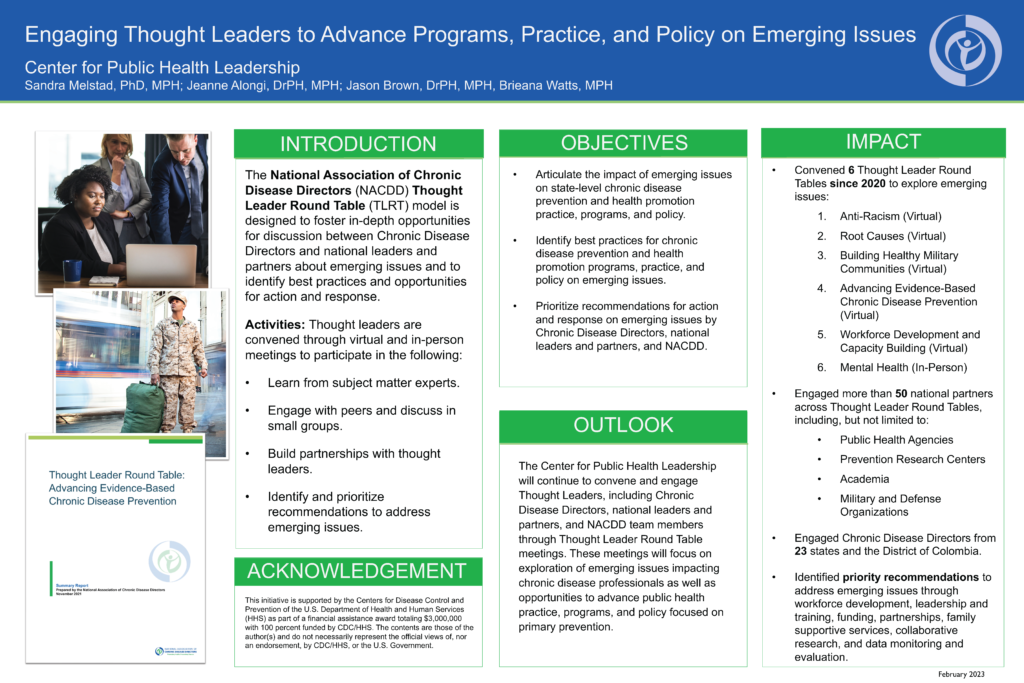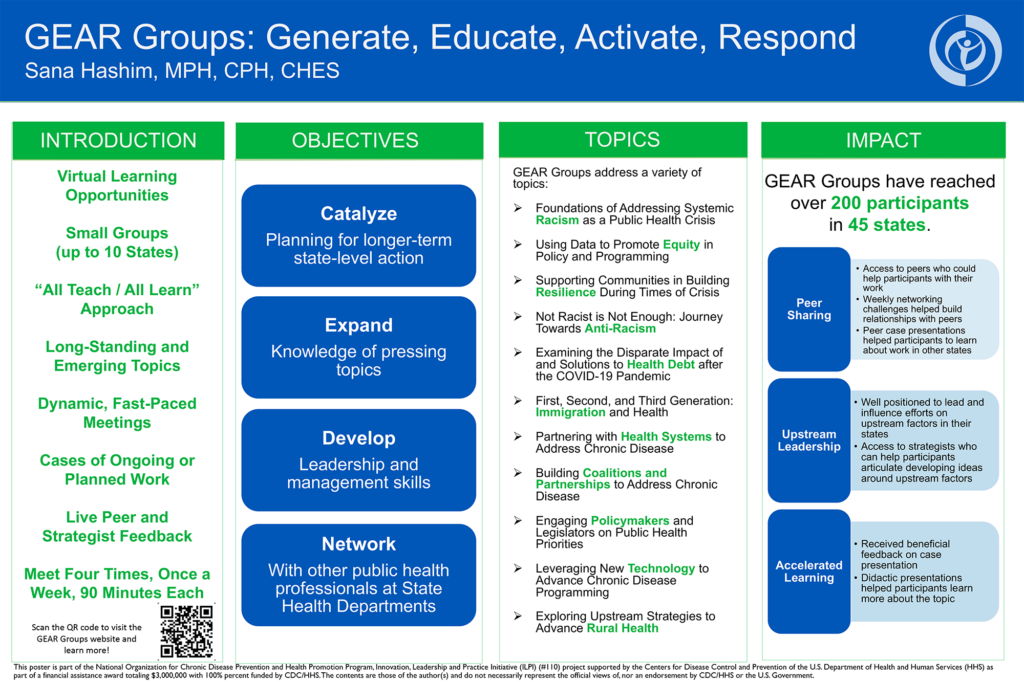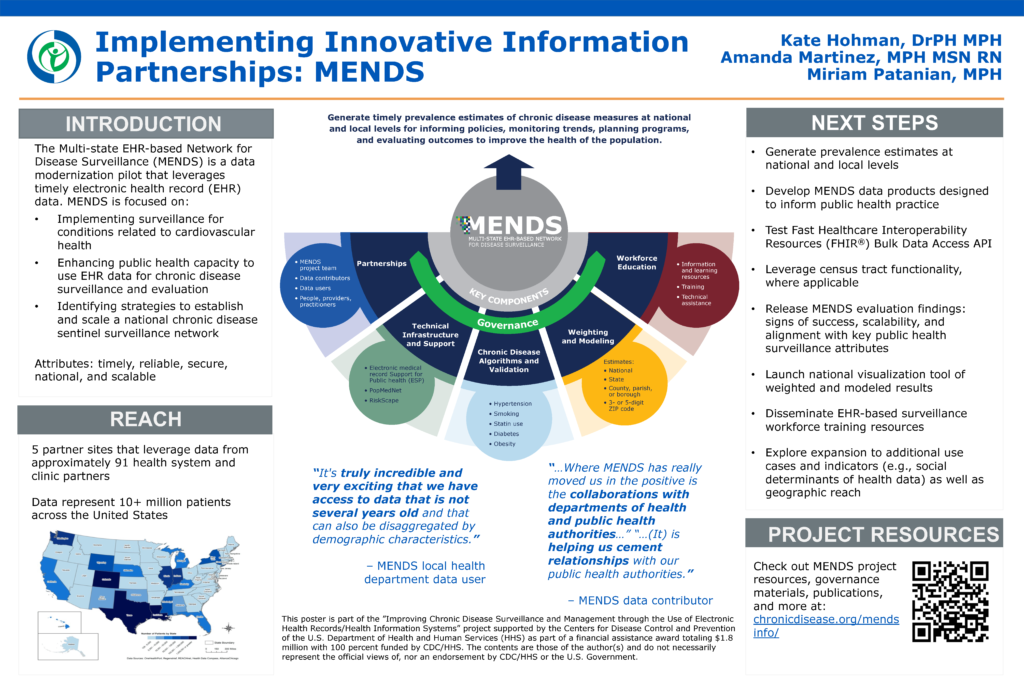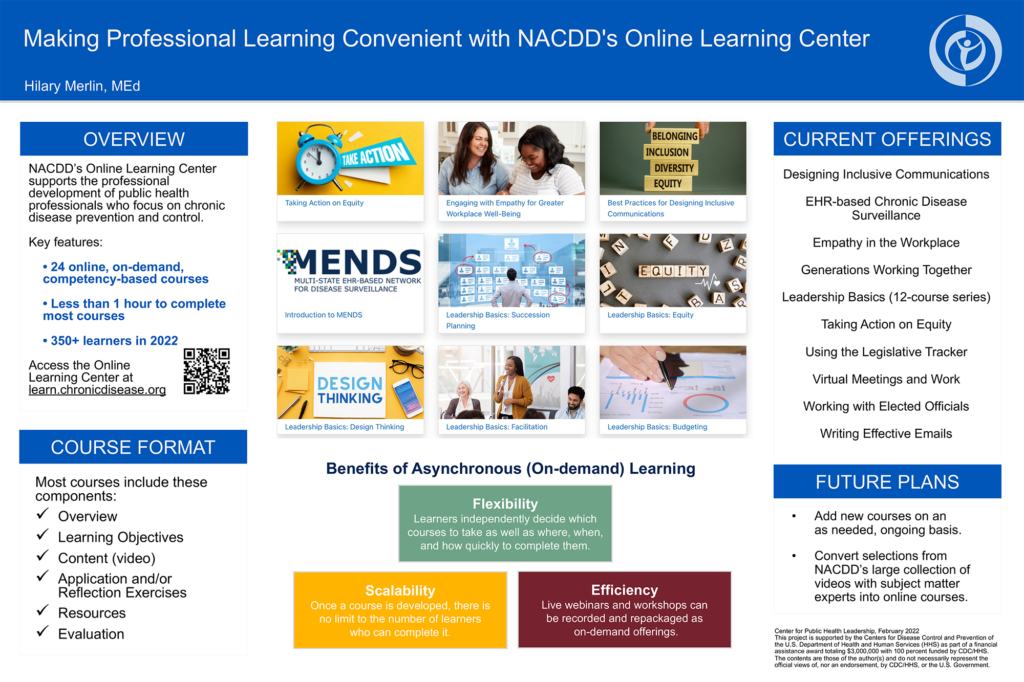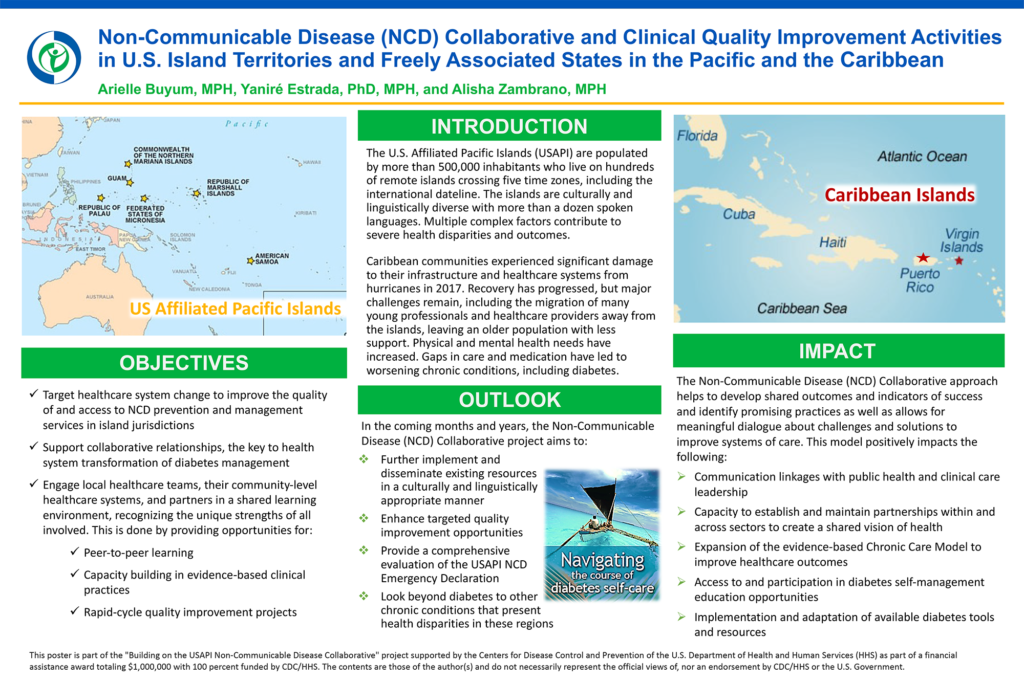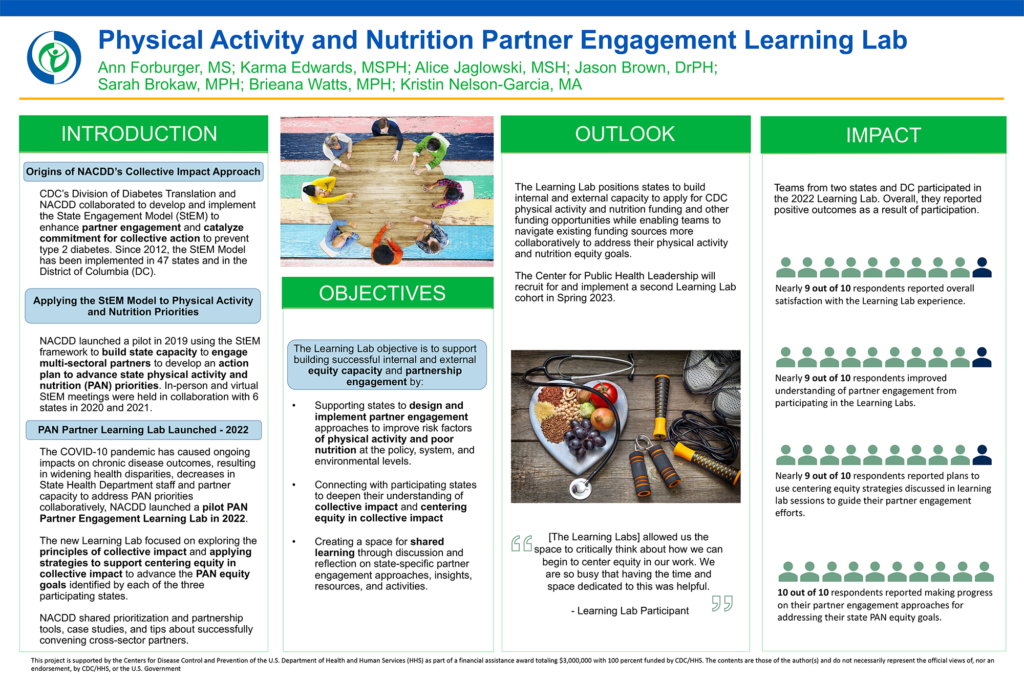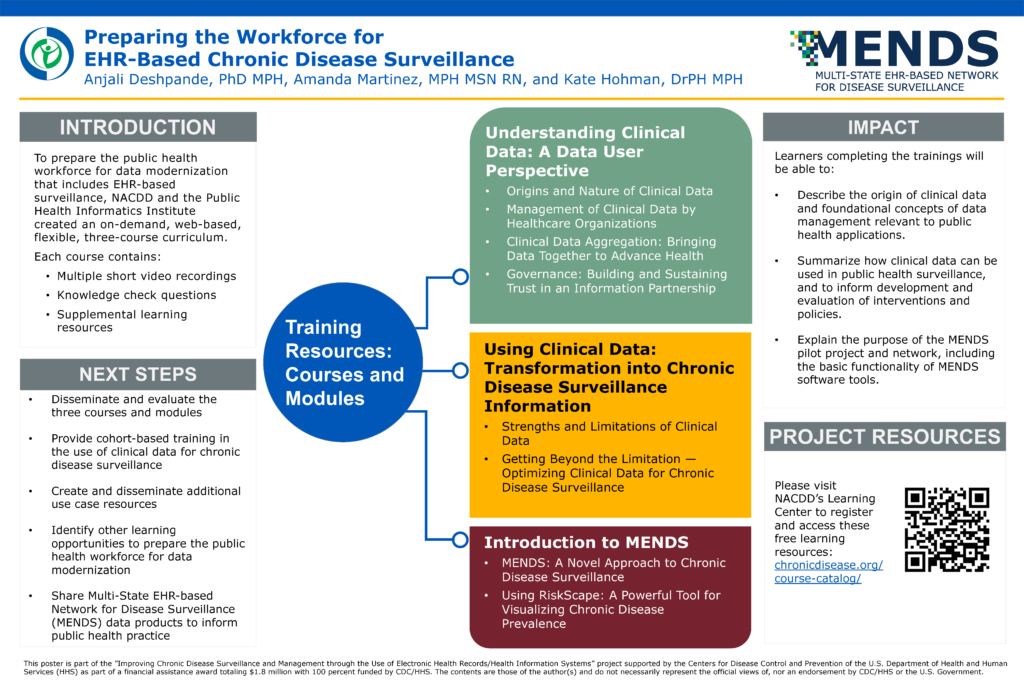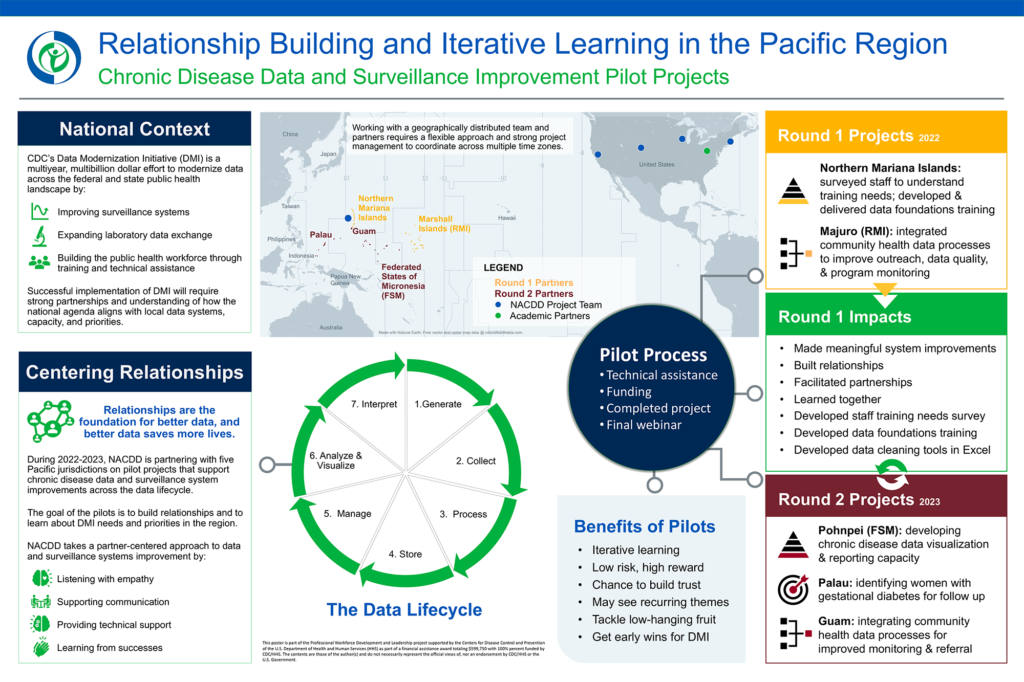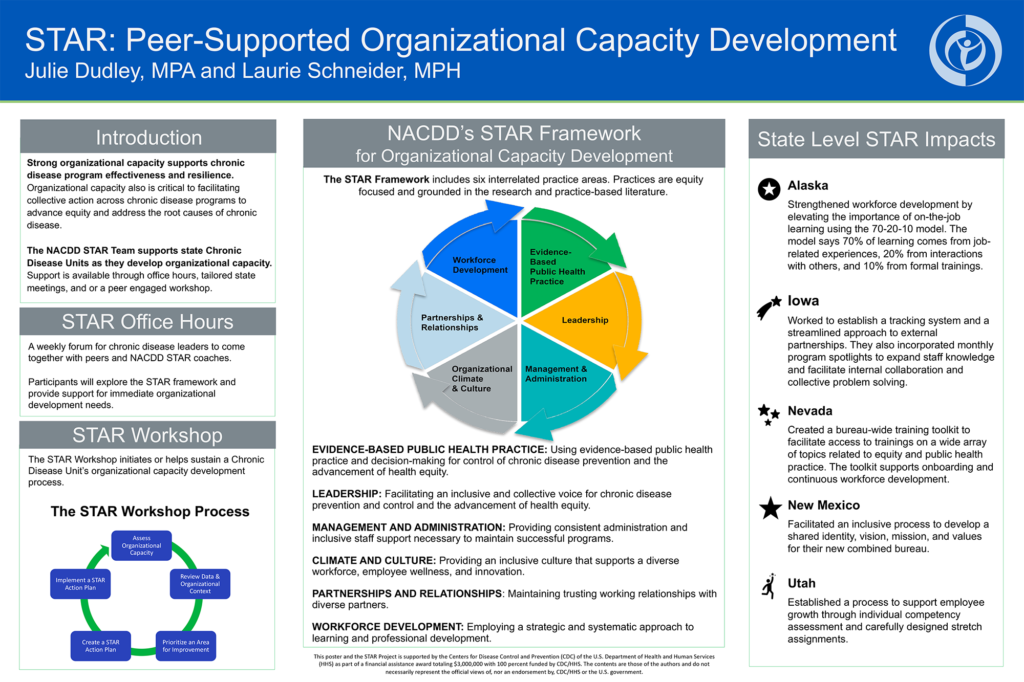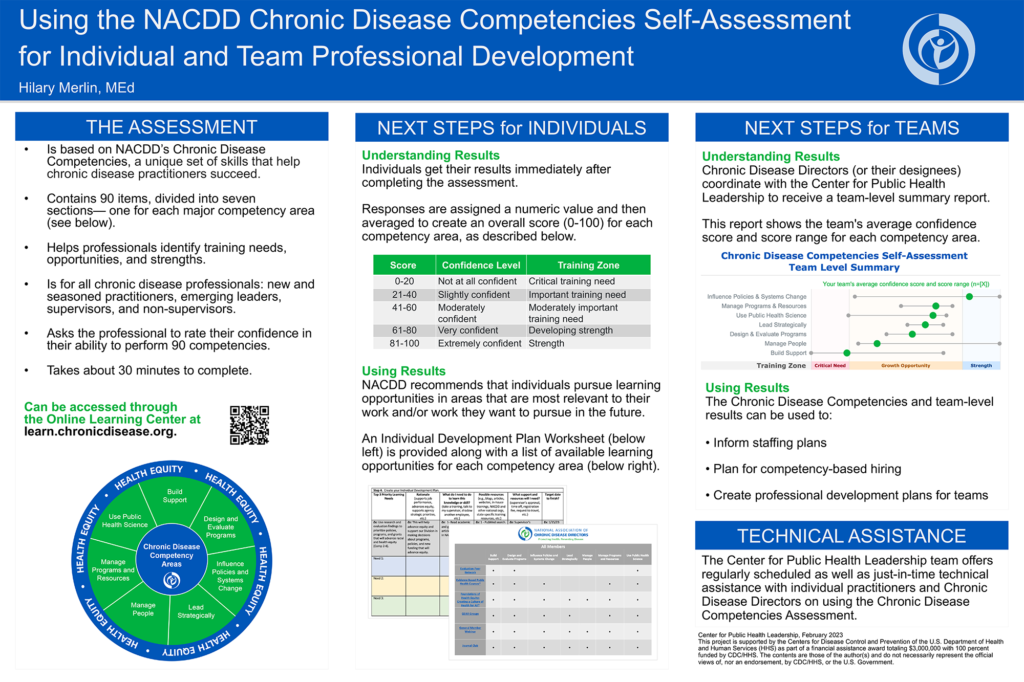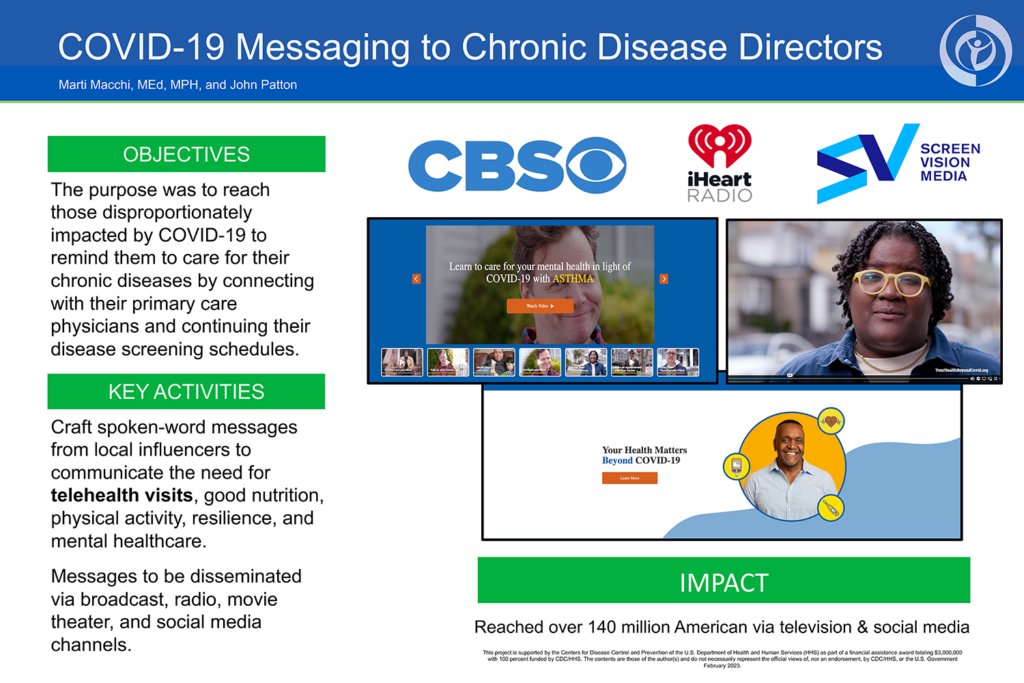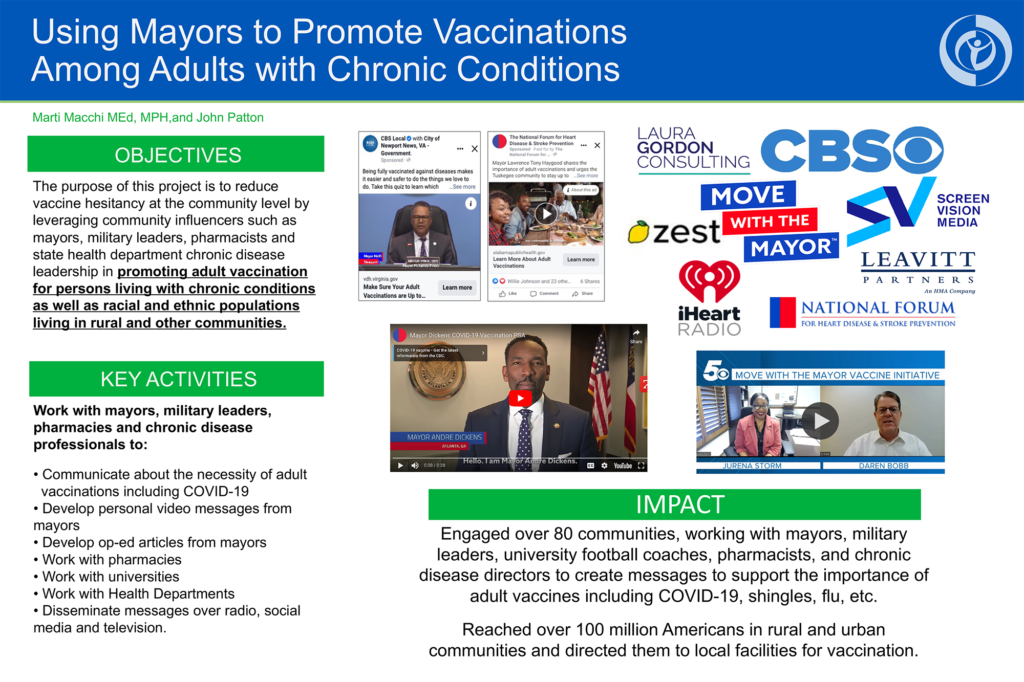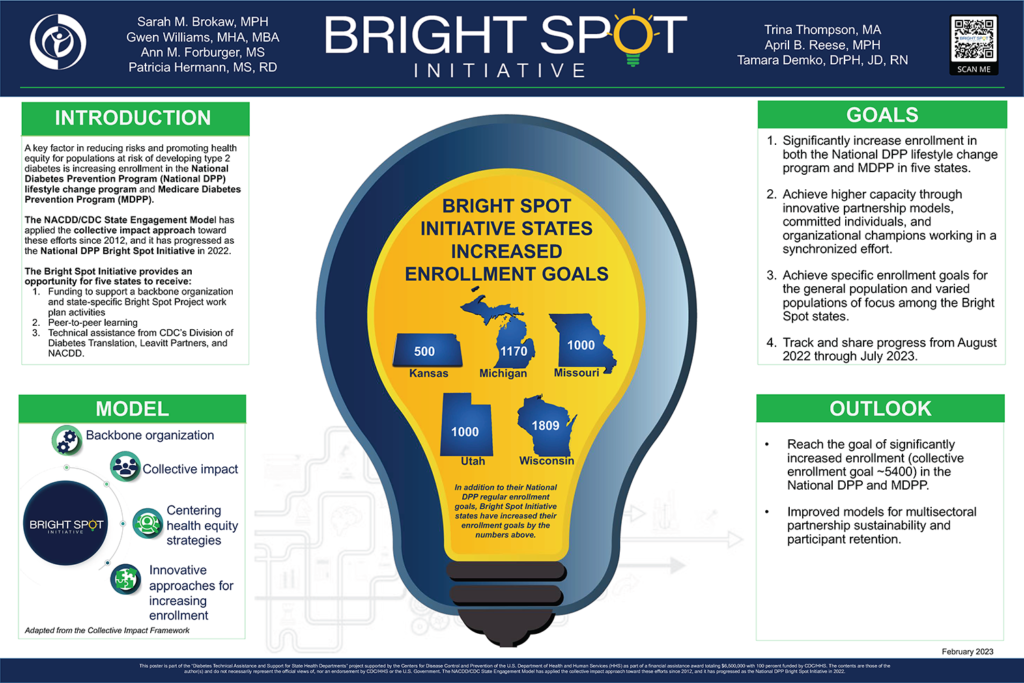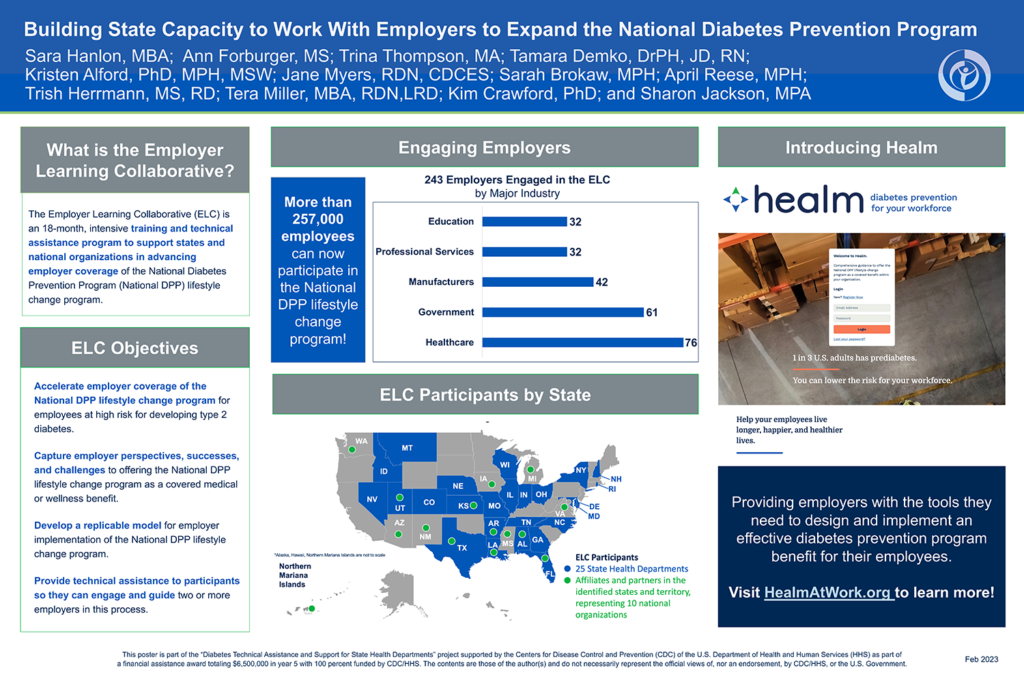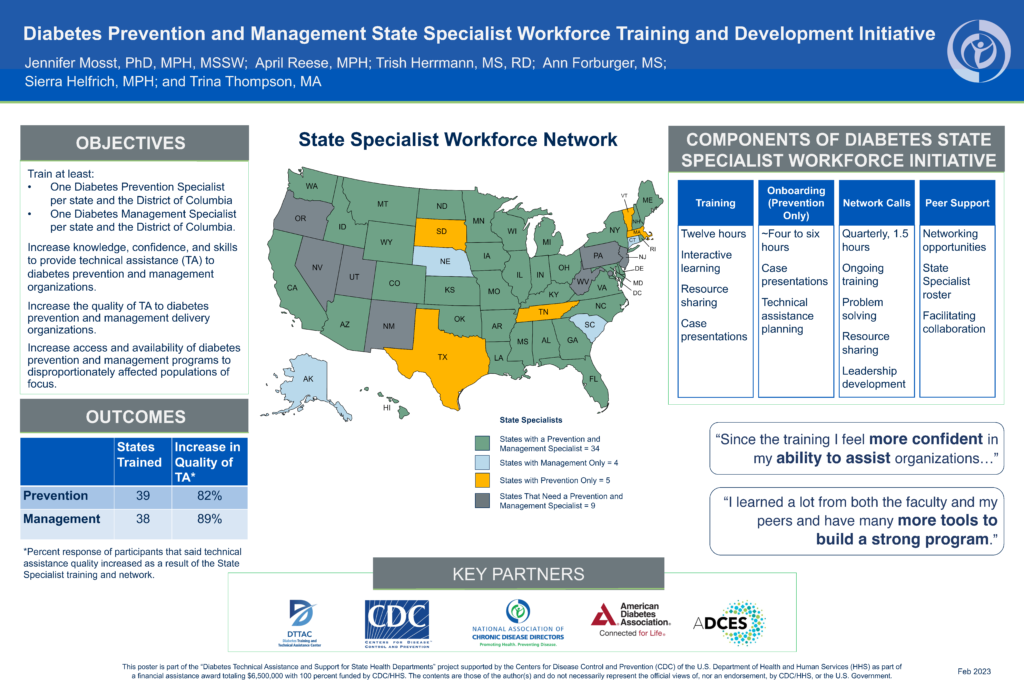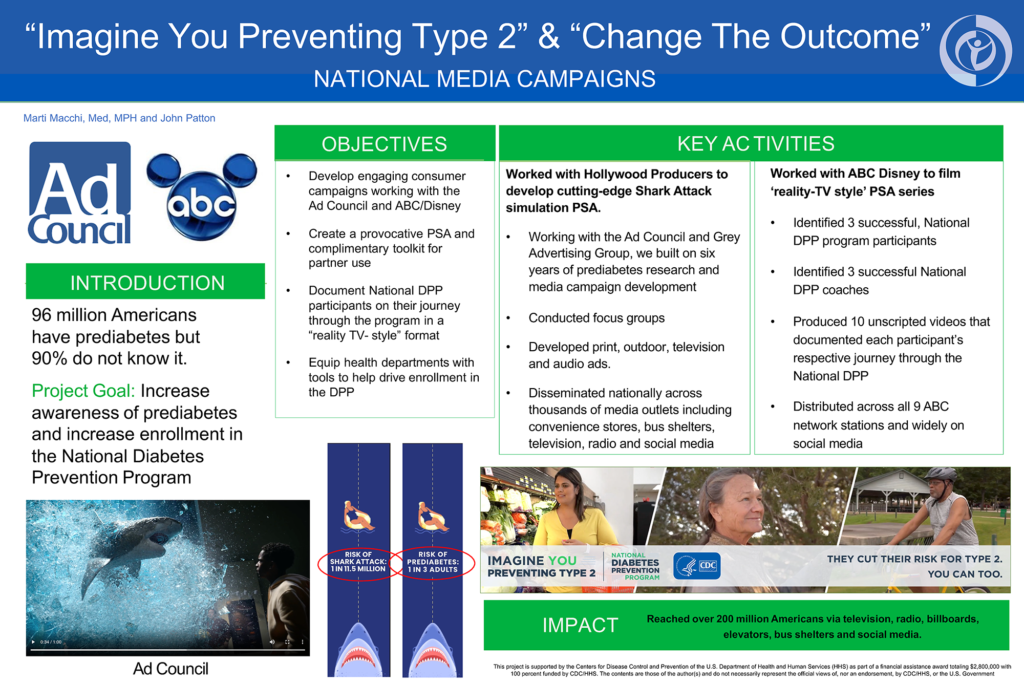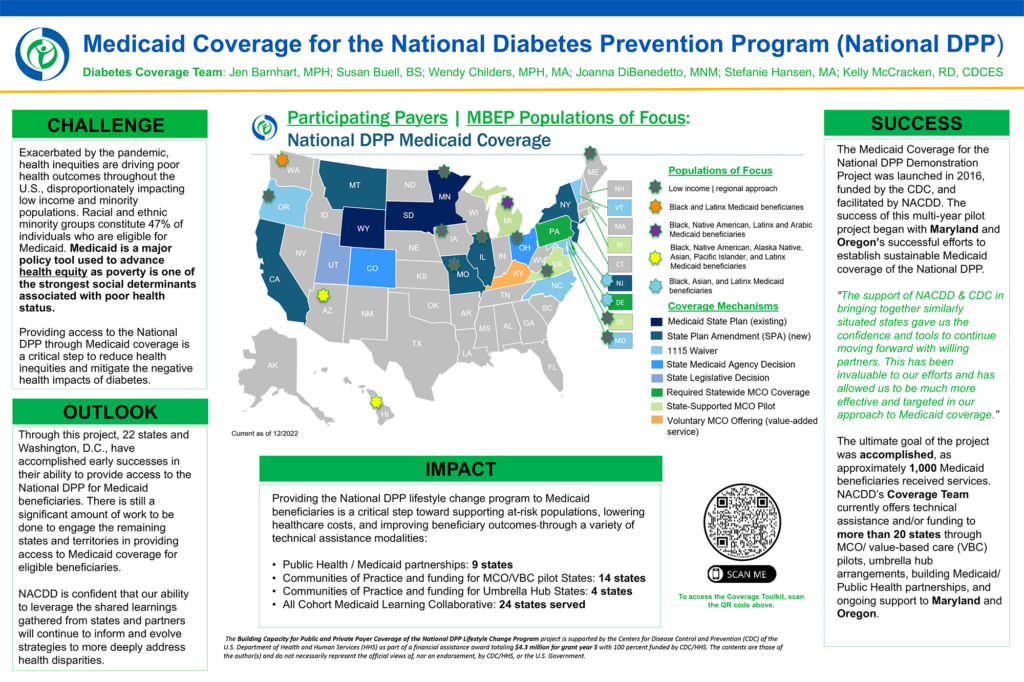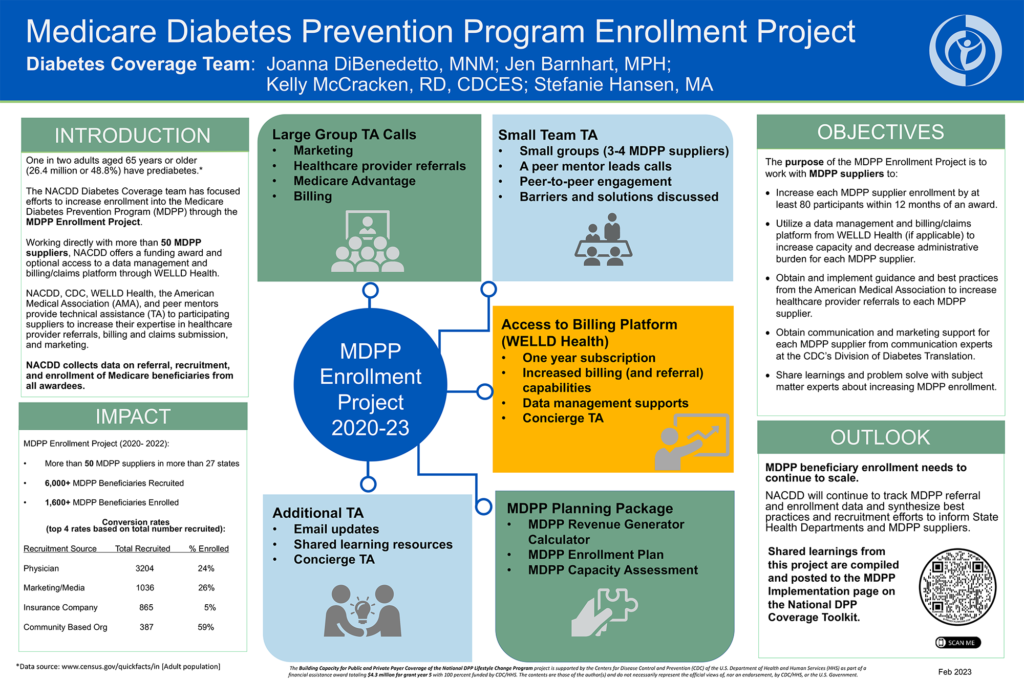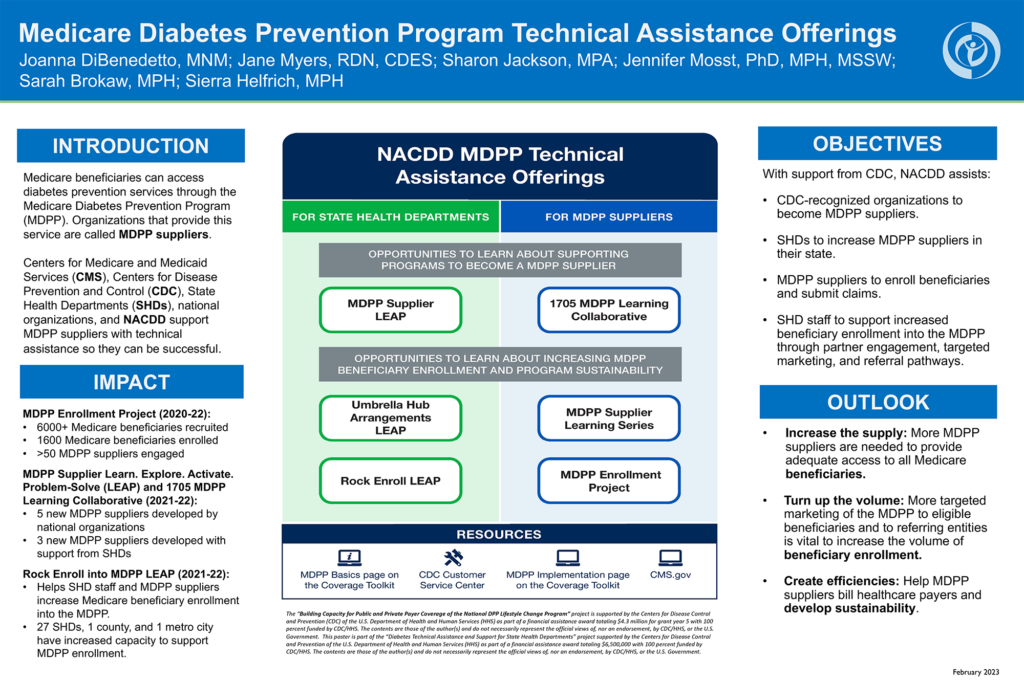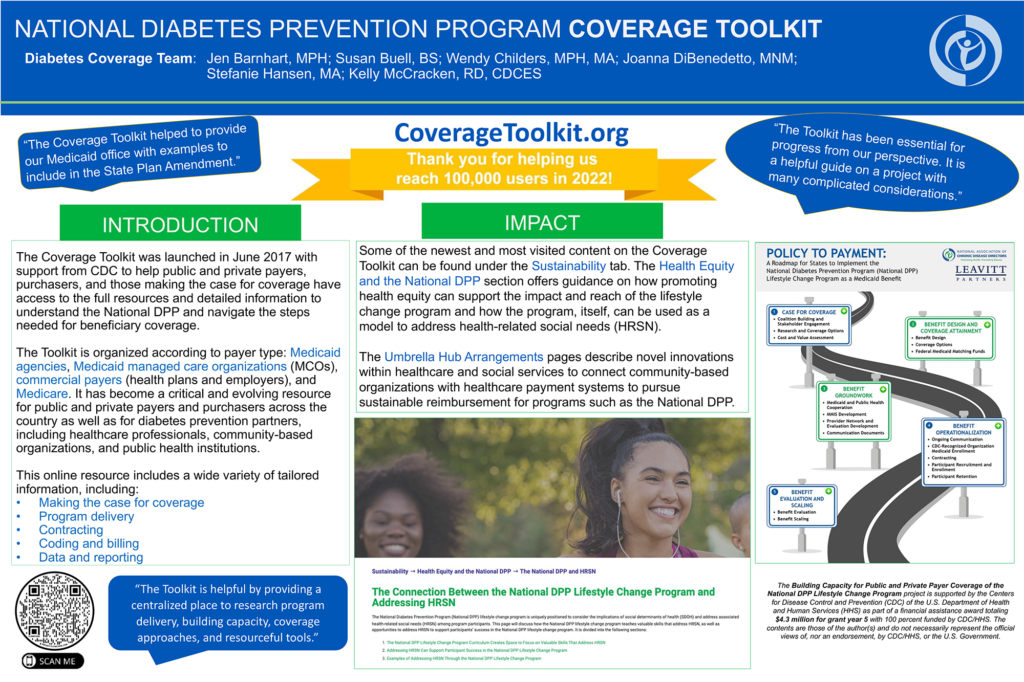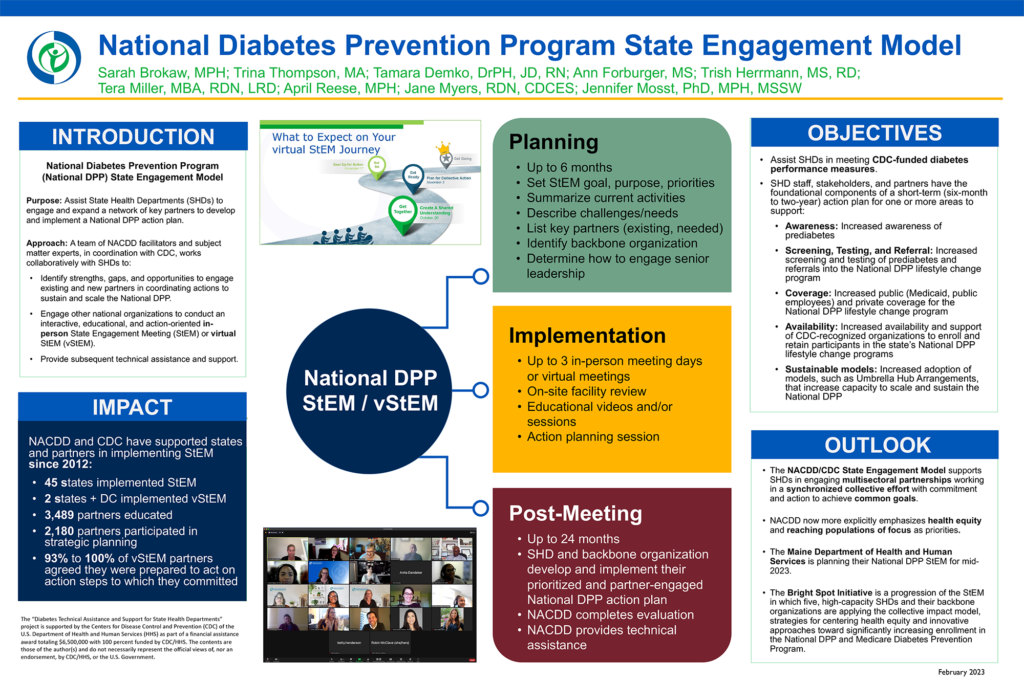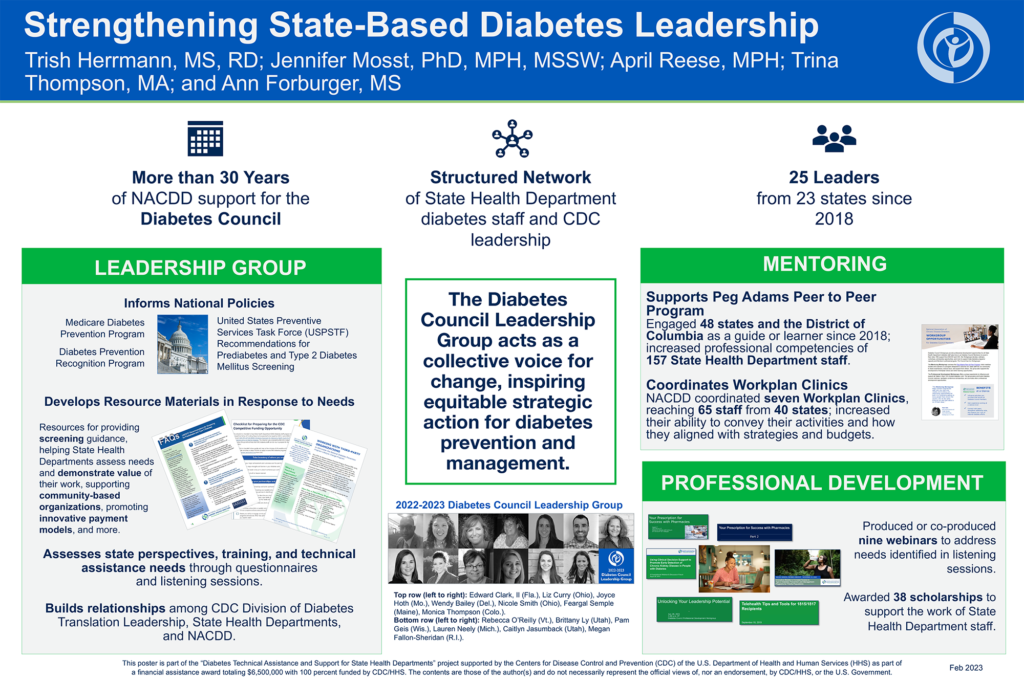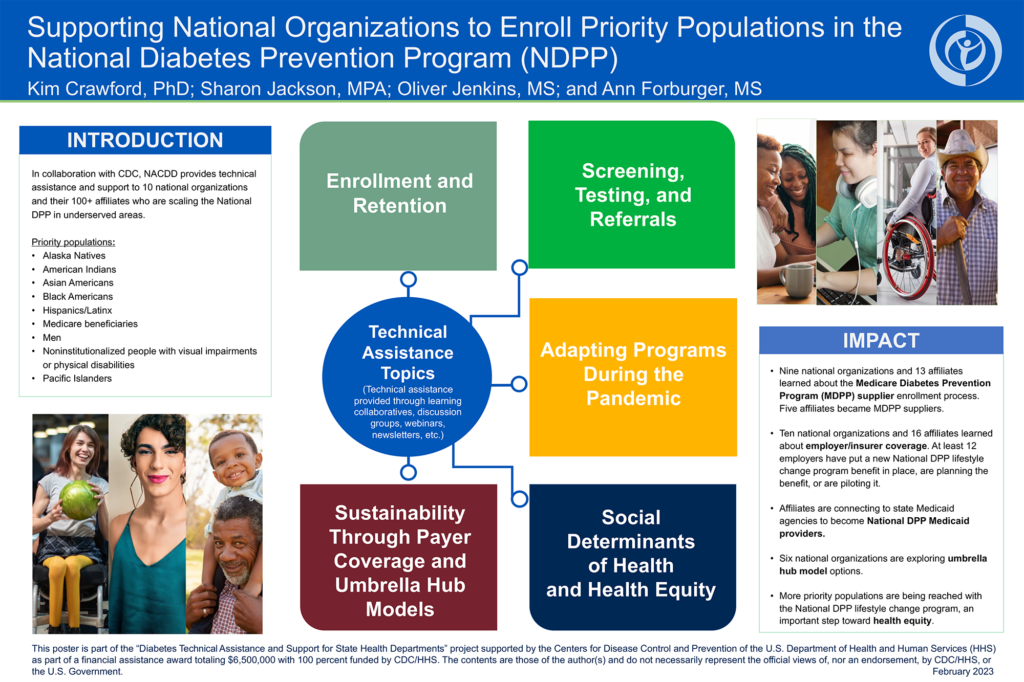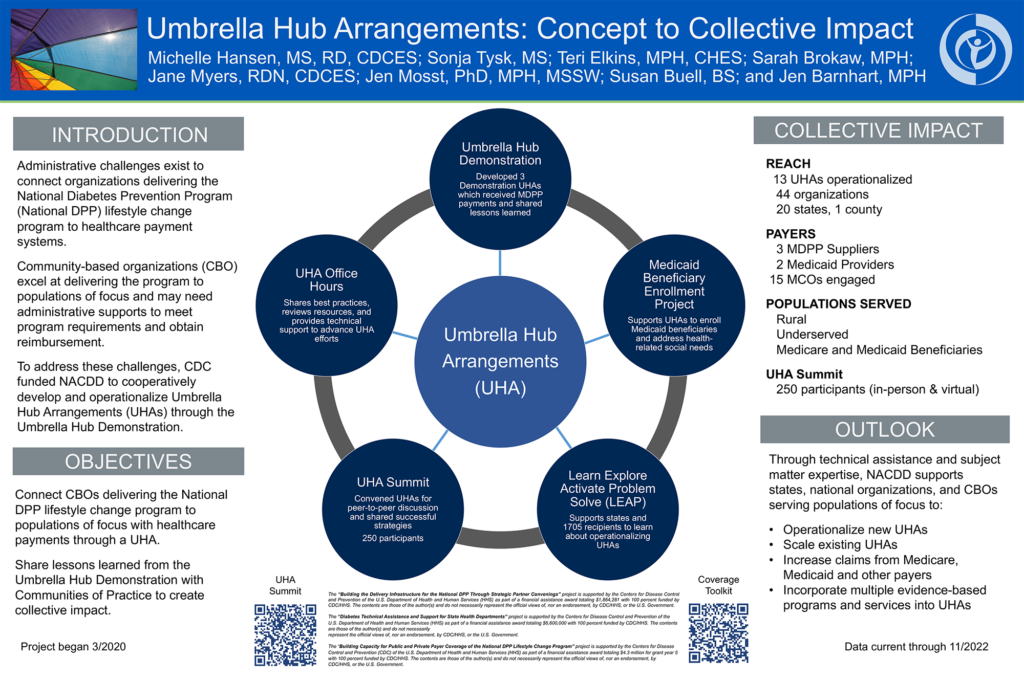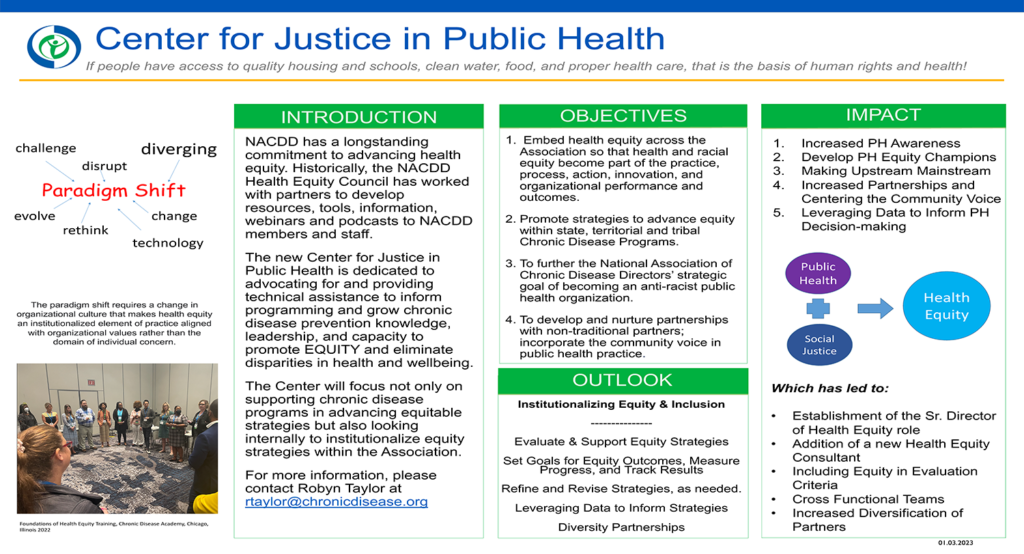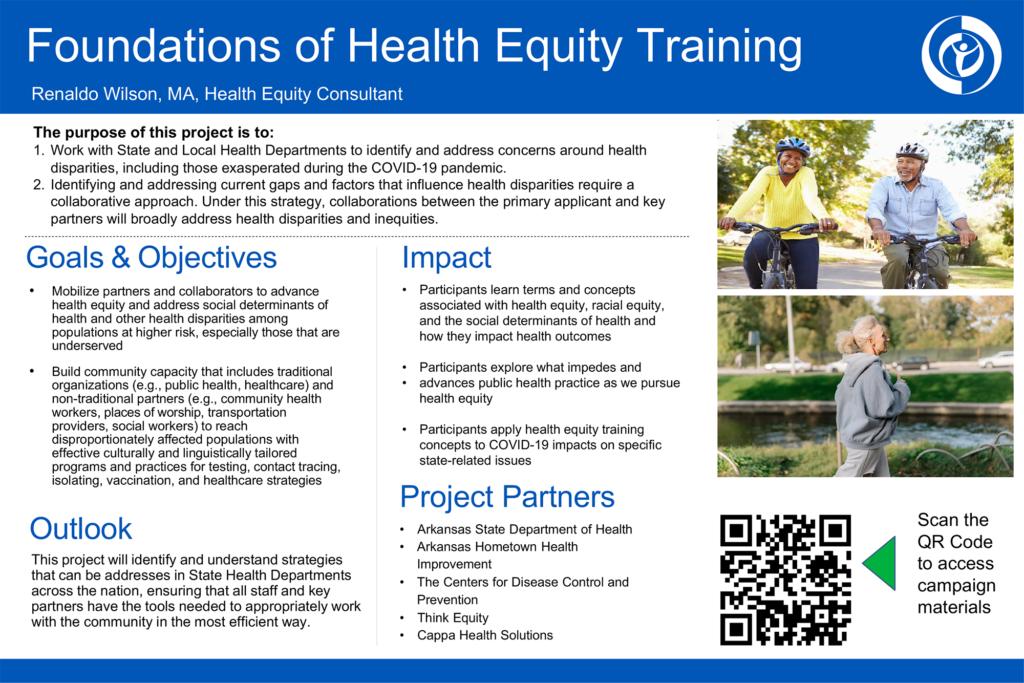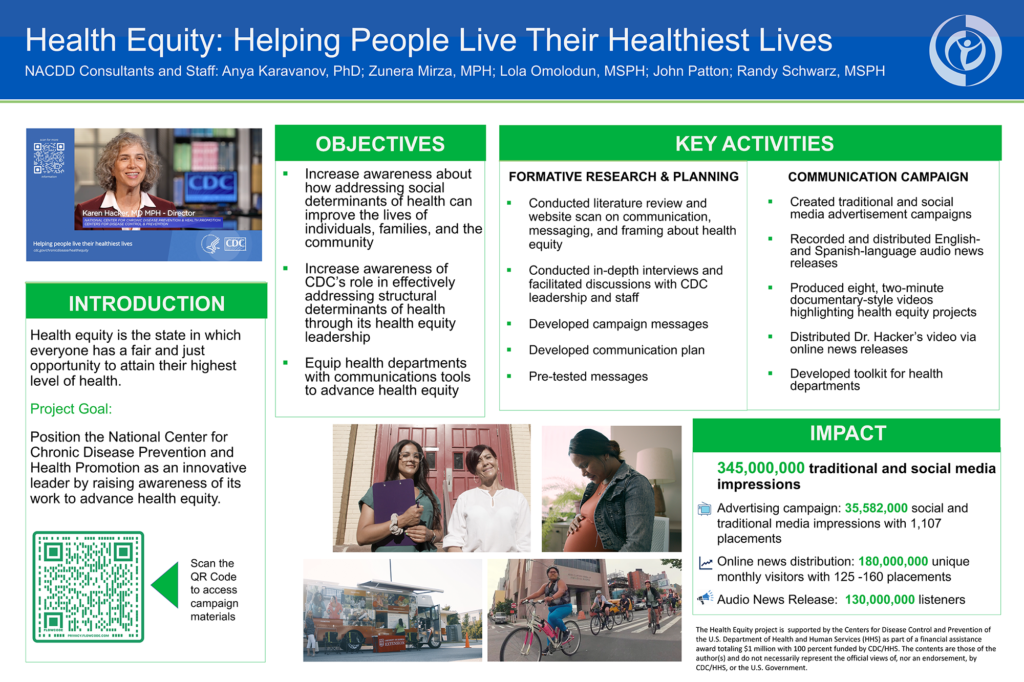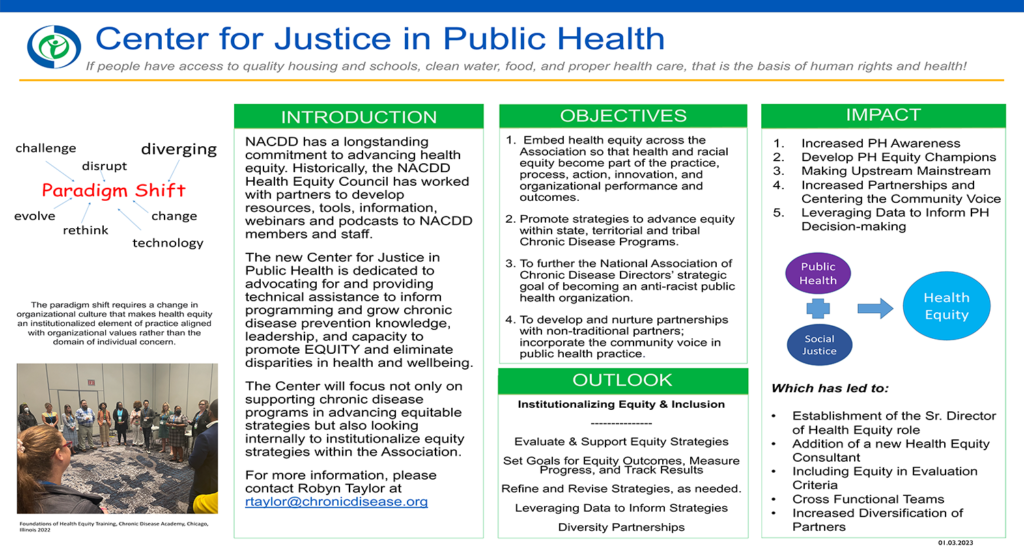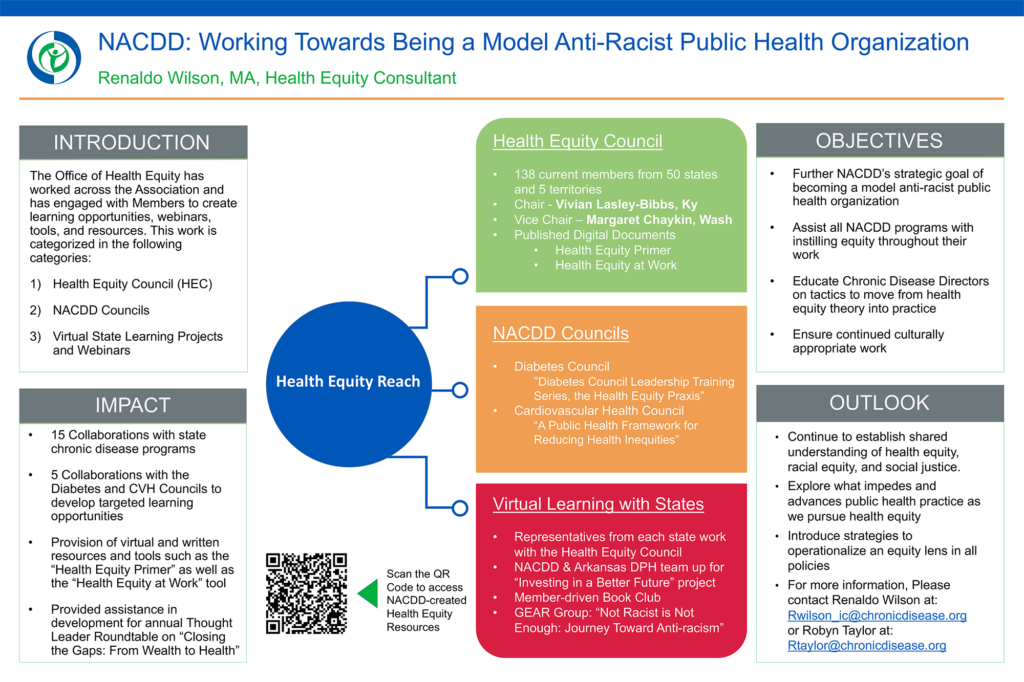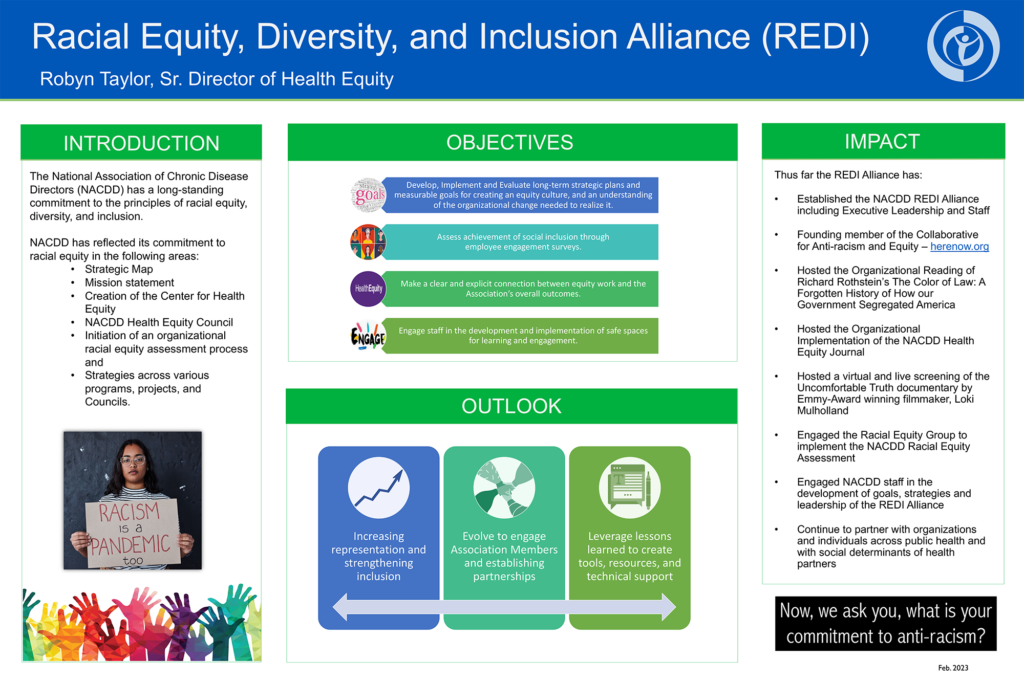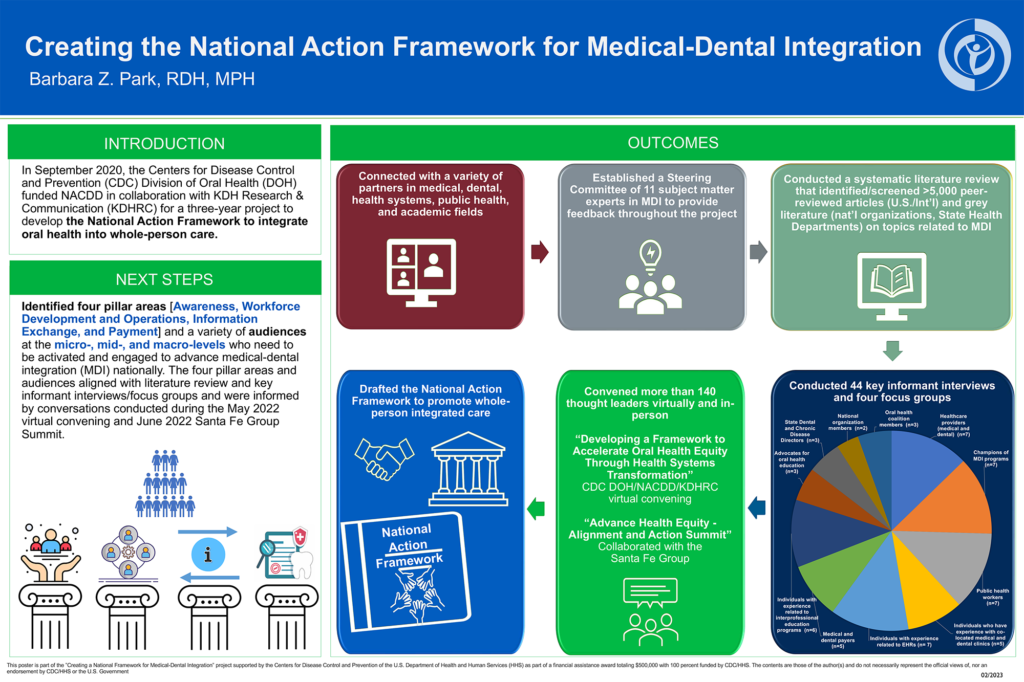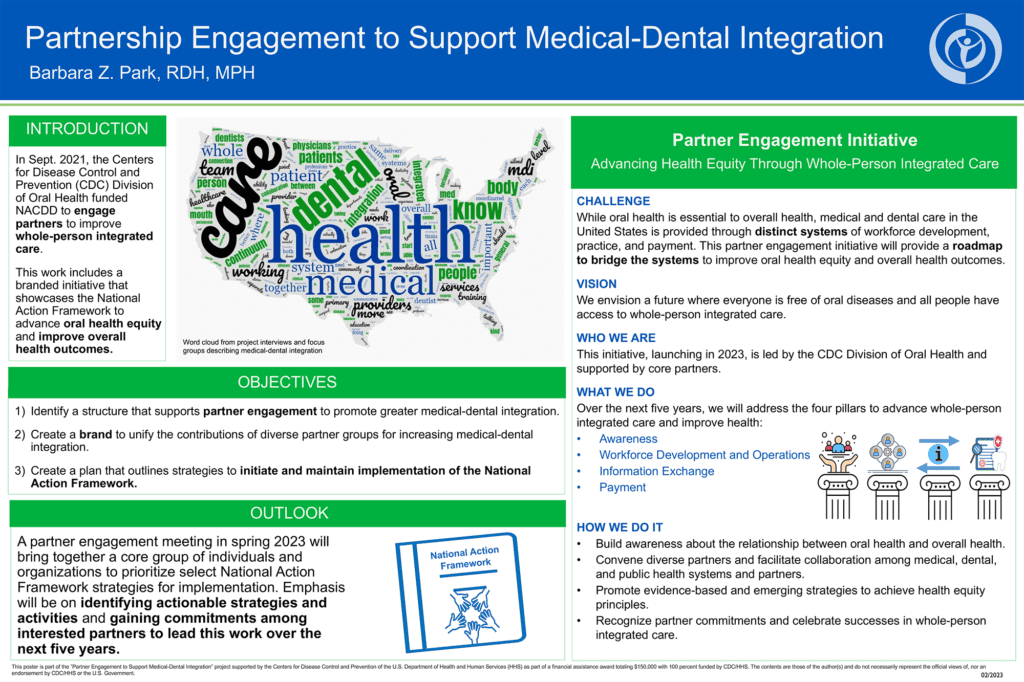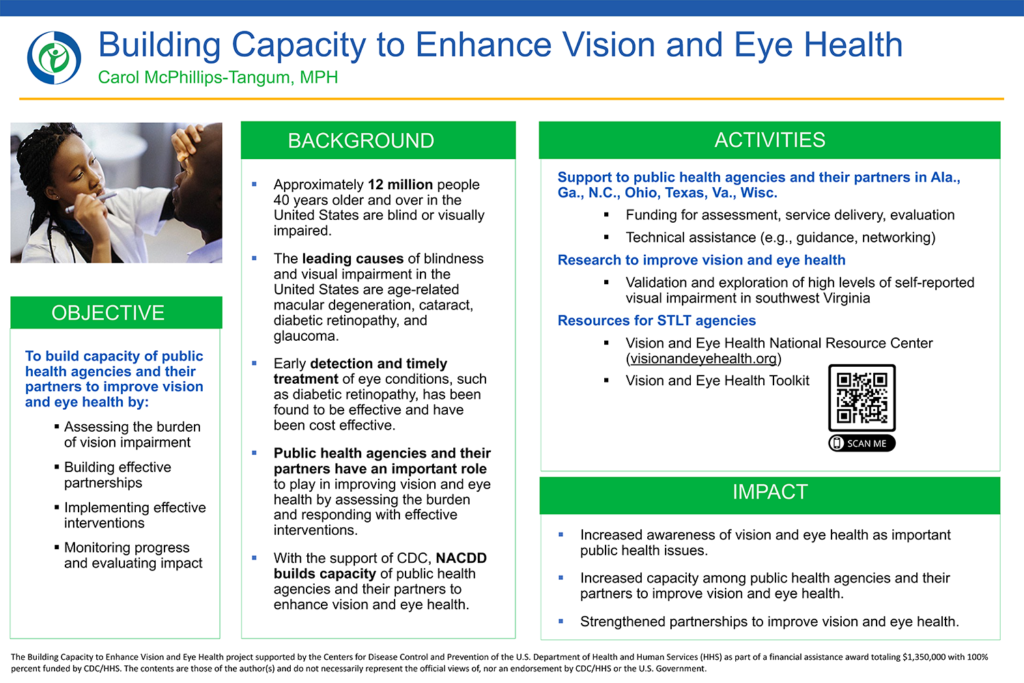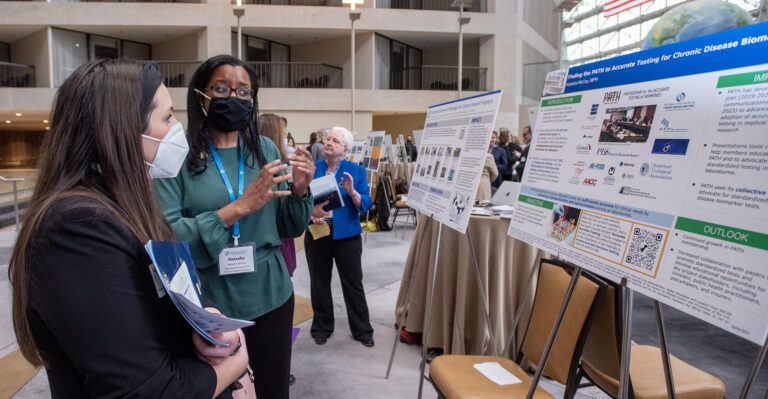
From Prevention to Transformation in Public Health: How States Advance Social Determinants of Health to Improve Equity and Social Justice
The 7th Annual Public Health Programs Success Showcase, “From Prevention to Transformation in Public Health: How States Advance Social Determinants of Health to Improve Equity and Social Justice,” was held on Feb. 2, 2023 at the Omni Atlanta Hotel at CNN Center in Atlanta. The Showcase featured more than 60 projects from our program portfolio.
View posters from the event below.
Alzheimer's
Leslie Best, Lead Consultant
This project adapts chronic disease risk reduction messages to include information about how behaviors related to these topics can also reduce the risk for cognitive decline. Guided by a Steering Committee of national experts in aging, public health, communications, and health equity, this project supports the Healthy Brain Initiative Road Map call to action to integrate best available evidence about brain health and cognitive decline risk factors into existing health communications that promote health and chronic disease management for people across the lifespan.
Biomarkers
Natasha McCoy, Senior Public Health Consultant
Accurate laboratory tests are essential for the proper prevention, diagnosis, treatment, and management of chronic diseases. The “PATH to Accurate Testing for Chronic Disease Biomarkers” poster provides an introduction and brief overview of the project’s objective, impact, and future opportunities for the Partnership to Improve Laboratory Measurements of Chronic Disease Biomarkers project.
Cancer
Anya Karavanov
Bring Your Brave is a powerful storytelling campaign that empowers women, their families, and healthcare providers to talk about hereditary breast and ovarian cancer. In partnership with CDC, NACDD developed a suite of digital resources that healthcare providers, community leaders, and patients can use to support family discussions about hereditary cancer and cancer prevention.
Leslie Best, Lead Consultant
This project is focused on specific topics at the intersection of cancer risk and health equity, including environmental contaminants, adverse childhood experiences, and the unique needs and concerns of specific populations, such as American Indian, Alaska Native, and Hispanic persons. This poster shares key activities within each topic and the overarching impact of this work.
Dawn Wiatrek, Ph.D., Public Health Consultant
The Cancer Screening Change Package is a quality improvement technical package that offers a conceptual framework with actionable approaches (change concepts) and specific strategies or ideas (change ideas). Change concepts and ideas are linked to evidence and practice-based tools and resources needed to improve cancer screening (colorectal, breast, cervical, lung, BRCA, and prostate).
Rebecca Palpant Shimkets, MS
NACDD through the Peer-to-Peer Learning Program hosted the Colorectal Cancer Control Virtual Training on November 1-2, 2022. It REflected on the program work over the last two years, REcommitted to the mission of supporting colorectal cancer screening nationally, and REignited the passion to accelerate cancer screening success through plenary panels, virtual exhibit booths, deeper dive sessions, and a virtual networking lounge.
Rebecca Palpant Shimkets, MS, Cancer Portfolio Public Health Consultant, NACDD and Lead, Peer-to-Peer Learning
The Peer-to-Peer Learning Program provides virtual opportunities for grantees of the National Breast and Cervical Cancer Early Detection Program (NBCCEDP) and the Colorectal Cancer Control Program (CRCCP) to engage with their peers around topics of importance to their work. Programming offered includes webinars, P2P call series, and virtual training using the vFairs platform that includes virtual exhibit booths in which programs can engage in chat and provide resources. The Peer-to-Peer Learning project strategies involve Leadership and Workforce Development, Partnerships, and Programs and Services.
Paula F. Clayton, MS, RDN, Public Health Consultant
NACDD supports state, territorial and tribal cancer programs by collecting real time information on proposed national and state policy changes that impact cancer prevention and control. Methods and approach to dissemination of information are highlighted.
Dawn Wiatrek, Ph.D., Public Health Consultant
Lorrie Graaf, RN, Public Health Consultant, NACDD
The goal of the Increasing Colorectal Cancer Screening Rates project was to work with state health departments and other partners to increase colorectal cancer screening rates using a variety of strategies including partnership building, data driven decision making, action planning to address barriers and facilitators to screening, and developing evidence based tools and resources that could be disseminated and implemented across states (i.e Mailed FIT). Over 15 states participated over the 5 year project and many implemented sustainable and far-reaching initiatives, including development and implementation of a statewide Medicaid CRC screening metric in California which was later adopted as part of the National CMS Medicaid Adult Core Set Quality Measures.
Randy Schwartz, MSPH
Paula Clayton, MS, RDN
Through strong Membership and partnerships, the Cancer Council works collaboratively with state, tribal, and territorial health departments to strengthen capacity to achieve a cancer-free tomorrow. The Council represents grantee programs of each of the CDC-funded cancer prevention and control programs.
Natasha McCoy, Senior Public Health Consultant
This poster describes a CDC-funded project established to increase enrollment and use of a web-based learning management system created by the FL and SC central cancer data registry systems. System is used by CDC-funded central cancer registries to support continued learning, exchange resources, and support training needs of staff and subcontractors.
Cardiovascular Health
Susan Svencer
Julia Schneider
Laura Warner
This poster provides an overview of the partnership between the NACDD Cardiovascular Health team and Million Hearts. Projects have spanned the past several years and continue to evolve to meet the changing needs of the landscape and partners, including the Million Hearts Hospitals and Health Systems Recognition program, Hypertension Control Champions, and the Cardiac Rehabilitation Think Tank. Most recently the partnership expanded with the addition of the Million Hearts Health Equity Implementation project, which is currently funding six organizations implementing Million Hearts strategies among priority populations.
Miriam Patanian
Julia Schneider
The CVH Initiative aims to do the following among State and Local Health Departments:
- Support training
- Identify learning opportunities
- Facilitate meaningful connections
- Provide the cardiovascular health perspective to other NACDD councils, CDC leadership, and national partners
Center for Advancing Healthy Communities
Heather Murphy, Public Health Consultant
Lisa Erck, Public Health Consultant
The Arthritis Portfolio is working to develop an arthritis care model that supports innovative efforts that enhance healthcare provider awareness, knowledge, and skills in promoting physical activity as an effective, drug-free way to relieve arthritis pain, improve function, and limit arthritis progression.
Mara Galic, Sr., Program Manager
Joann Donnelly, Public Health Consultant
Leah Rimkus, Sr. Evaluator
This poster provides a summary of the Building Resilient Inclusive Communities (BRIC) program, which is housed within NACDD’s Center for Advancing Healthy Communities. In collaboration with the CDC’s Division of Nutrition, Physical Activity, and Obesity (DNPAO), Division of Population Health (DPH), and a team of nationally recognized experts, NACDD has provided funding, training, and technical assistance to 20 states to implement state- and community-level actions in response to the COVID-19 pandemic. As part of the program, states are engaging more than 60 communities to address food and nutrition security, safe physical activity access, and social connectedness through policy, systems, and environmental (PSE) change strategies. Social determinants of health, health equity, and social justice principles are integrated into the planning and implementation of all three strategy areas. The poster shares accomplishments from the first two years of the BRIC program as well as planned activities and products for Year 3.
Lisa Erck, Public Health Consultant
Laura DeStigter, Public Health Consultant
The Work@Health portfolio is training health promotion professionals in the Work@Health curriculum to complement, amplify, and expand state-based efforts to engage employers in building effective, comprehensive, evidence-based workplace health programs.
Pascale D. Edouard, DrPH, Public Health AmeriCorps Program Manager
Heidi Milby, MPH, Associate Director, Center for Advancing Healthy Communities
The National Association of Chronic Disease Directors (NACDD) was recently awarded two new cooperative agreements – Public Health AmeriCorps (PHA) and the CDC’s National Initiative to Advance Health Equity in K-12 Education by Preventing Chronic Disease and Promoting Healthy Behaviors (“School Health”). These initiatives innovatively address rising issues in public health that have been exacerbated by the COVID-19 pandemic including public health workforce deficits and poor social, emotional, and mental well-being among school staff and students. These programs leverage cross-sector partnerships to expand state agency capacity, knowledge, and skills.
Catherine McCann, Public Health Consultant
Healthy Military Communities (HMC) supports collaboration between state and local public health and the military and works to increase awareness of the unique health challenges faced by military families. HMC is a program of the Center for Advancing Healthy Communities (CAHC) within the National Association of Chronic Disease Directors. The CAHC exists to fosters healthy communities for all by advancing health equity and eliminating social barriers to health.
Alice Jaglowski, MSH
Katherine Cacal, MPH
Mari Brick, MA
NACDD is one of 10 national recipients of the cooperative agreement CDC DP17-1705 – Scaling the National Diabetes Prevention Program (National DPP) in Underserved Areas. The 1705 National DPP project is embedded in the Center for Advancing Healthy Communities (CAHC) within the National Association of Chronic Disease Directors (NACDD).This multi-year project implements five strategies to increase access to program, support referrals for enrollment, marketing for enrollment, retention in the program and reimbursement for the National DPP across five states (AK, FL, IA, NY, and PA) and focuses on reaching people with disabilities with inclusive practices.
Patrilie Hernandez, MS, Public Health Consultant
Charita James, MS, RDN, Public Health Consultant
Crystal E. Doxie, MBA, Grants Manager
Launched January 1, 2022, the SPINE program seeks to address food and nutrition security through equitable and sustainable actions that tackle economic and social conditions limiting food and nutrition security across the lifespan through a policy, systems, and environmental (PSE) change lens. NACDD is providing tailored and extensive training and technical assistance (T/TA) to nine SPINE states to build and implement sustainable partnerships and programs and services into existing efforts, especially in communities disproportionately affected by chronic disease risk factors and the COVID-19 pandemic.
Karma Edwards, MSPH
This poster describes NACDDs Walkability Action Institute project and how a community’s built design promotes or prohibits our access to everyday destinations and items that we need to thrive, such as being able to access where we live, learn, work, play, pray, and receive care by way of active travel (walking, biking, moving, or taking public transit). The poster additionally describes the project’s objectives and events for the current calendar year, as well as lists the high level successes and impact over the last eight years.
Center for Public Health Leadership
Julie Dudley, MPA, Public Health Consultant
CDC and NACDD are working to close the gap between practice and research. Closing this gap is an opportunity to strengthen the adoption, implementation, and scaling up of evidence-based programs, policies, and practices for the prevention of chronic diseases and other leading causes of death and disability in the United States. This poster describes findings, recommendations, and next steps based on recent formative research to better understand the barriers and opportunities for closing the gap between research and chronic disease practice.
Jeanne Alongi, DrPH, MPH, Vice President – Public Health Leadership, Director – Center for Public Health Leadership
The Center for Public Health Leadership serves the members of NACDD through offering a variety of organizational and professional development opportunities to meet the needs of the public health workforce. Bi-annually, NACDD hosts their flagship event– The Chronic Disease Academy– as an opportunity for practitioners to network, learn, and grow in their approaches to addressing chronic disease within their jurisdictions. This poster highlights the 2022 Academy held in Chicago.
Kristin Nelson-Garcia
Jeanne Alongi
The Center for Public Health Leadership serves the members of NACDD through offering a variety of organizational and professional development opportunities to meet the needs of the public health workforce. Bi-annually, NACDD hosts their flagship event– The Chronic Disease Academy– as an opportunity for practitioners to network, learn, and grow in their approaches to addressing chronic disease within their jurisdictions. This poster highlights the 2022 Academy held in Chicago.
Kate Hohman, Associate Director of Public Health Practice
Amanda Martinez and Miriam Patanian, Consultants
Learn about how the Multi-state EHR-based Network for Disease Surveillance (MENDS), a data modernization pilot project, works. The poster includes potential use cases for MENDS data products to improve the health of the population.
Jeanne Alongi, DrPH, MPH, Vice President – Public Health Leadership, Director – Center for Public Health Leadership, NACDD
Sandra Melstad, NACDD Consultant
The National Association of Chronic Disease Directors (NACDD) Thought Leader Round Table (TLRT) model is designed to foster in-depth opportunities for discussion between Chronic Disease Directors and national leaders and partners about emerging issues and to identify best practices and opportunities for action and response. The poster provides a summary of the TLRT model and meetings that have been convened since 2020 to engage Thought Leaders on emerging issues.
Sana Hashim, MPH, CPH, CHES, NACDD Public Health Consultant
GEAR Groups are peer-to-peer, case-based, action learning opportunities for state chronic disease practitioners. GEAR Groups use a virtual “All Teach / All Learn” approach to professional development. Using Zoom, GEAR Groups engage up to 10 states with a facilitator and strategist to explore emerging or long-standing chronic disease prevention and control topics. Participants present cases of ongoing or planned work and receive peer and strategist feedback. Meetings are facilitated conversations among participants requiring preparation and active participation.
Kate Hohman, Associate Director of Public Health Practice
Amanda Martinez and Miriam Patanian, Consultants
Learn about the Multi-state EHR-based Network for Disease Surveillance (MENDS), a distributed network for surveillance that leverages EHR data to generate timely prevalence estimates of chronic disease risk measures at national and local levels. Implementing
MENDS has a focus on six key areas:
- Governance
- Partnerships
- Technical infrastructure and support
- Chronic disease algorithms and validation
- Weighting and modeling
- Workforce education for public health data users
Yanire Estrada, Caribbean Lead Consultant
Alisha Zambrano, Island Portfolio Lead Consultant
The Non-Communicable Disease (NCD) Collaborative addresses Islander health through the provision of technical assistance for diabetes prevention and management. The NACDD Islands Portfolio includes the US Affiliated Pacific Islands and jurisdictions and Puerto Rico and the US Virgin Islands in the Caribbean.
Using the Chronic Care Model, NACDD supports island jurisdictions in the implementation of quality improvement strategies that help improve chronic disease health outcomes. The NCD Collaborative offers peer-to-peer learning opportunities, leadership-focused training, and opportunities for rapid-cycle quality improvement projects.
Jason Brown
Ann Forburger
Since 2012, NACDD has implemented the State Engagement Model (StEM) in 47 states and the District of Columbia (DC) to advance the National Diabetes Prevention Program and state physical activity and nutrition priorities. Building from the original StEM success, NACDD’s Center for Public Health Leadership Team developed a Partner Engagement Learning lab to respond to the changing needs and capacity of the public health workforce. This poster highlights the 2022 pilot Physical Activity and Nutrition Partner Engagement Learning Lab, which was focused on the principles of collective impact and applying strategies to support centering equity in collective impact.
Kate Hohman, Associate Director of Public Health Practice
Implementation of CDC’s Data Modernization Initiative (DMI) will require strong partnerships and understanding of how the national agenda aligns with local data systems and priorities. During 2022-2023, NACDD is partnering with five Pacific jurisdictions on chronic disease data and surveillance system improvement pilot projects to build relationships and learn more about how to best support DMI implementation in the Pacific region.
Julie Dudley, MPA, Public Health Consultant, NACDD Center for Public Health Leadership
The NACDD STAR Team supports state chronic disease units as they work to develop organizational capacity. Support is available on demand and through a structured, peer engaged, multi-meeting workshop. This poster describes the NACDD STAR Framework for organizational capacity development and capacity development successes by participating state chronic disease units.
Hilary Merlin, MEd, Professional Development Specialist
NACDD’s Chronic Disease Competencies are a unique set of skills that help chronic disease practitioners succeed. This poster describes the Competencies Self-Assessment as well as how both individuals and teams can use the results to advance practice.
COVID
Diabetes
Gwen Williams
The National DPP Bright Spot Initiative provides an opportunity for states and organizations to receive funding, peer-to-peer learning, and technical assistance from the Centers for Disease Control and Prevention’s (CDC) Division of Diabetes Translation and the National Association of Chronic Disease Directors (NACDD) to dramatically increase enrollment in the National DPP and MDPP through strategic partnerships that will commit to specific enrollment goals for the general population and priority populations and will track and share progress.
Sara Hanlon
The Employer Learning Collaborative (ELC) supports State Health Departments and national organizations in advancing employer coverage of the National Diabetes Prevention Program (National DPP) lifestyle change program. More than 257,000 employees now have access to the National DPP lifestyle change program due to the work of the ELC.
Employer coverage will now be boosted by Healm, a virtual platform to support employers as they consider and implement the National DPP lifestyle change program, taking employer engagement to a new level. Visit the poster for a demonstration of Healm!
April Reese
The Diabetes Prevention and Diabetes Management State Specialist Workforce Training and Development Initiative was developed in partnership between NACDD, the CDC, state public health leaders, and other leaders in diabetes programming with the goal of enhancing State Health Departments’ (SHD) ability to provide quality technical assistance and support to diabetes program providers in their state.
The Initiative engages participants using virtual trainings, ongoing network calls, and peer support. Currently, 39 SHDs have a diabetes prevention specialist and 38 SHDs have a diabetes management specialist.
Jennifer Barnhart, MPH, Public Health Consultant
Providing the National DPP lifestyle change program to Medicaid beneficiaries is a critical step toward supporting at-risk populations, lowering health care costs and improving beneficiary outcomes through a variety of TA modalities:
Public Health / Medicaid partnerships: 9 states
Communities of Practice and funding for MCO/VBC pilot States: 14 states
Communities of Practice and funding for Umbrella Hub States: 4 states
All Cohort Medicaid Learning Collaborative: 24 states served.
The ultimate goal of the project was accomplished, as approximately 1000 Medicaid beneficiaries received services and both MD and OR have achieved sustainable Medicaid coverage. NACDD’s Coverage team currently offers technical assistance and/or funding to over 20 states through MCO/ value-based care (VBC) pilots, umbrella hub arrangements, building Medicaid/ Public Health partnerships, and ongoing support to Maryland and Oregon.
Joanna DiBenedetto, MNM
Beginning in April 2018, the National DPP lifestyle change program became a covered preventive service for eligible Medicare beneficiaries through the Medicare Diabetes Prevention Program (MDPP)—the first preventive service model tested by CMMI to be expanded into Medicare and a landmark for public health. Program delivery organizations with CDC preliminary or full recognition are eligible to apply as MDPP suppliers.
Centers for Medicare and Medicaid Services (CMS), Centers for Disease Prevention and Control (CDC), State Health Departments (SHDs), national organizations, and NACDD support MDPP suppliers with technical assistance so they can be successful.
Jennifer Mosst
With support from CDC, NACDD helps increase supplier enrollment in the Medicare Diabetes Prevention Program (MDPP) by providing technical assistance to CDC-recognized organizations and State Health Departments. NACDD supports CDC-recognized organizations to become suppliers, and supports MDPP suppliers to enroll participants and submit claims. NACDD also supports State Health Department staff and national organization staff who in turn support the MDPP suppliers and CDC-recognized organizations in their state. Learn more about this work by visiting our poster!
Kelly McCracken, RD, CDCES
The National Diabetes Prevention Program (National DPP)
Coverage Toolkit helps payers and those making the case for
coverage fully understand the program, navigate the steps needed
to cover it, and access detailed information and resources. The
Toolkit is organized according to payer type: Medicaid agencies,
Medicaid managed care organizations (MCOs), commercial
payers (health plans and employers), and Medicare. A virtual
overview is available that describes the site’s organization,
provides tips for navigation, and highlights tools and resources.
Tamara Demko
The NACDD/CDC National Diabetes Prevention Program (National DPP) State Engagement Model supports State Health Departments in engaging multisectoral partnerships working in a synchronized collective effort with commitment and action to achieve common goals toward scaling and sustaining the National DPP.
The State Engagement Meeting (StEM) process consists of planning, implementation, and post-meeting support. NACDD and CDC have supported 45 StEM states since 2012 and three virtual StEM states since 2021 and is supporting one state in planning their StEM for 2023. A progression of the State Engagement Model is the Bright Spot Initiative.
Meredith Ludden
NACDD’s Diabetes Council includes more than 250 Members from State Health Departments and the District of Columbia who work on diabetes initiatives. The Council connects State Health Departments across the nation for the purpose of implementing diabetes prevention and management strategies.
The Diabetes Council Leadership Group is an elected body of State Health Department diabetes staff. The Leadership Group is a bridge between CDC and State Health Departments, making it easier for states to fulfill grant requirements and achieve success. Their collective voice for change enables them to advocate on behalf of State Health Departments, connect colleagues across the country, and inspire strategic direction for diabetes prevention and management.
Kim Crawford
In collaboration with CDC, NACDD provides technical assistance and support to 10 national organizations and their 100+ affiliates who are scaling the National DPP in underserved areas for the following priority populations: African Americans, American Indians, Alaska Natives, Asian Americans, Hispanics, Medicare beneficiaries, men, noninstitutionalized people with visual impairments or physical disabilities, and Pacific Islanders.
Topics explored through technical assistance and support have included enrollment and retention, screening/testing/referrals, social determinants of health and health equity, sustainability through payer coverage and umbrella hub models, and adapting programs during the pandemic.
Impacts have included new Medicare Diabetes Prevention Program (MDPP) suppliers, more employers pursuing coverage of the National DPP lifestyle change program (LCP), affiliates taking steps toward becoming National DPP Medicaid providers, and exploration of umbrella hub models for sustainability. Ultimately, more priority populations are being reached with the National DPP LCP, an important step toward health equity.
Michelle Hansen, Public Health Consultant
Sonja Tysk, Public Health Consultant
Teri Elkins, Public Health Consultant
Jane Myers, Public Health Consultant
Jen Barnhart, Public Health Consultant
Umbrella Hub Arrangements (UHAs) connect community-based organizations (CBOs) with health care payment systems to pursue sustainable reimbursement for the National Diabetes Prevention Program (National DPP) lifestyle change program. CBOs excel at reaching populations of focus and may need administrative supports to meet program requirements and obtain reimbursement. To address these challenges, CDC funded NACDD to cooperatively develop and operationalize UHAs through the Umbrella Hub Demonstration. Lessons learned from the Umbrella Hub Demonstration have been scaled through NACDD Communities of Practice: UHA Office Hours, Medicaid Beneficiary Enrollment Project, Learn Explore Activate Problem Solve (LEAP); to result in collective impact. Through these collaborative efforts in less than three years NACDD has reached 44 organizations, helped to operationalize 13 UHA, and shared collective learnings with 250 participants at a UHA Summit. To learn more visit the “Umbrella Hub Arrangements from Concept to Collective Impact” poster.
Health Equity
Oral Health
Barbara Park, Public Health Consultant
This poster describes the partnership between NACDD, KDH Research and Communication, and CDC’s Division of Oral Health to create a partnership engagement strategy and ‘brand’ for promoting the National Action Framework for medical-dental integration that NACDD has been working on for the past 2-1/2 years.

